#Hidoro Shinpei
Text

#golden kamuy#saturo noda#ogata hyakunosuke#mangacap#chapter 56#hijikata toshizo#nagakura shinpachi#hidoro shinpei
13 notes
·
View notes
Text
Barato Yakuza Hidoro’s ‘Herring’ House
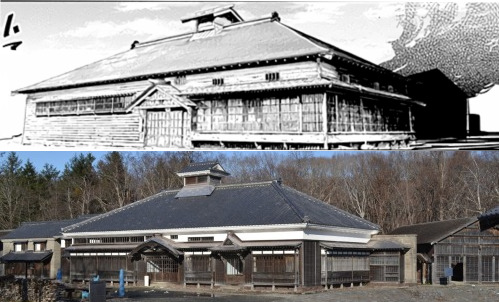
It is based on the
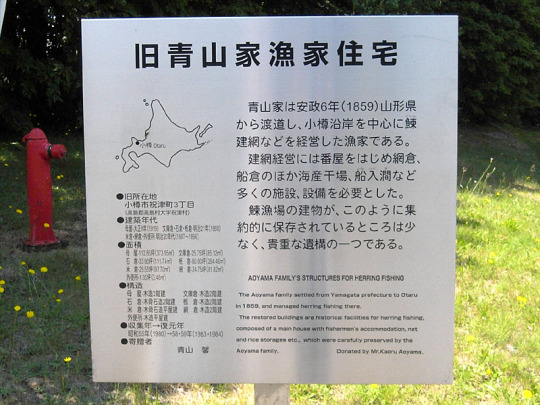
Aoyama Herring Lodge



View of bannister from where Ogata was sitting:-
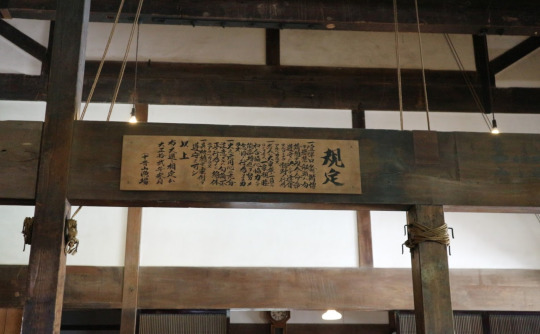
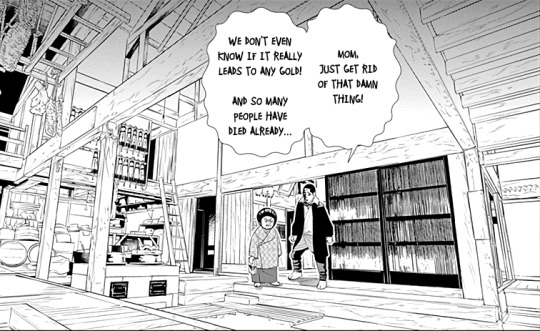

Another view:-
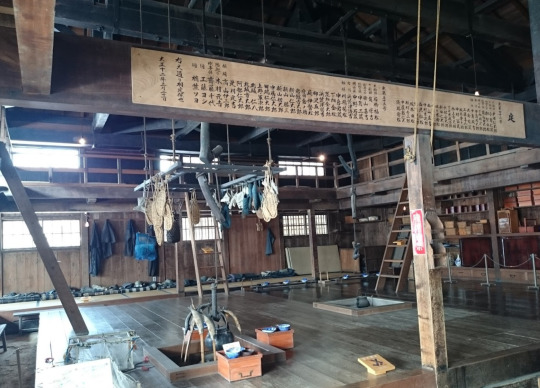
.
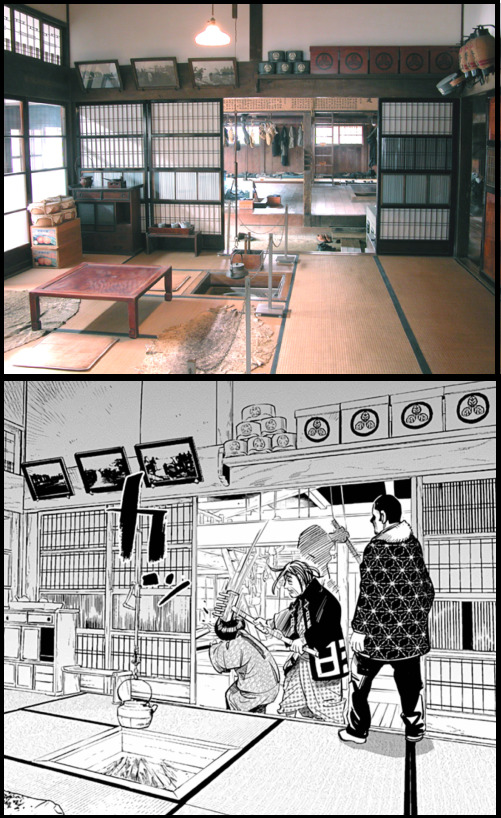
#golden kamuy#boss hidoro#hidoro family#shinpei hidoro#hijikata toshizo#ogata hyakunosuke#golden kamuy trivia
34 notes
·
View notes
Photo


back to GK, here are some good characters (my favorite outta the main 3 + my favorite minor characters)
#tanigaki ushiyama and ogata arent minor otherwise theyd be here too#golden kamui#golden kamuy#shiraishi kuranosuke#henmei kazuo#wakayama#nazakawa#shinpei hidoro#edogai yasaku#my art#knives /#i feel like i should.....tag for edogai but idk What id tag rn
15 notes
·
View notes
Text
Dueling Bodyguards and Giant Birds Run Amok in Golden Kamuy OAD
Golden Kamuy, an ongoing TV anime that adapts the adventure / survival / gourmet / gag manga by Satoru Noda about different factions searching for a cache of stolen Ainu gold in early 20th century Hokkaido, is returning for a second season in the Fall of 2018, but the series is also getting a pair of episodes that will adapt the "Attack Of The Mysterious Winged Terror!" and "Bodyguard Of The Snow-Swept Plains" chapters of the manga.
The episodes will be included on an OAD (original animation DVD) that will be bundled as a bonus with the Japanese special edition release of Volume 15 of the Golden Kamuy manga, which hits book stores in Japan on September 19, 2018. New cast members have been announced for the episodes, including:
Wataru Takagi as Umakichi Kusuda.
Nobuo Tobita as Tamotsu Hidoro.
Uko Tachibana as Okami.
And Yōji Ueda as Shinpei Hidoro
Golden Kamuy is directed by Hitoshi Nanba and features animation by Geno Studio. The first season of Golden Kamuy is currently streaming on Crunchyroll, who describe the story as follows:
The story takes place in the mighty Northern field of Hokkaido, the time is in the turbulent late Meiji Era. A post war soldier Sugimoto, aka, “Immortal Sugimoto” was in need of large sums of money for a particular purpose…. What awaited Sugimoto, who stepped into Hokkaido’s Gold Rush with dreams of making a fortune, was a tattoo map leading to a hidden treasure based on hints inscribed on the bodies of convicts in Abashiri Prison?! The magnificent nature of Hokkaido vs vicious convicts and the meeting with a pure Ainu girl, Asirpa!! A survival battle for a hidden treasure hunt begins!
Sources:
Ota-suke
Comic Natalie
---
Paul Chapman is the host of The Greatest Movie EVER! Podcast and GME! Anime Fun Time.
0 notes
Text
The official Golden Kamuy manga website has updated with the announcement of the cast members for the upcoming OVA.
The new cast members include:
Wataru Takagi: Umakishi Kusuda
Nobuo Tobita: Tamotsu Hidoro
U-ko Tachibana: Okami
Yōji Ueda: Shinpei Hidoro
Wataru Takagi: Umakishi Kusuda
Nobuo Tobita: Tamotsu Hidoro
U-ko Tachibana: Okami
Yōji Ueda: Shinpei Hidoro
As reported earlier, the OVA will be released in the 15 compiled volume of the Golden Kamuy manga, which will be released on September 19. The OVA will focus on the Barato Arc of the manga, which features the Ogata Hyakunosuke and Hijikata Toshizō.
Also reported earlier, the manga will also include the “mini episode” titled, “Bizzare! The Mysterious Giant Island (Kaiki! Nazo no Kyodaijima).”
Source: ANN, Official Website
Golden Kamuy OVA Cast Members Revealed
The official Golden Kamuy manga website has updated with the announcement of the cast members for the upcoming OVA.
Golden Kamuy OVA Cast Members Revealed The official Golden Kamuy manga website has updated with the announcement of the cast members for the upcoming OVA.
#"The Escape King" Yoshitake Shiraishi#Anime#Anime News#Asirpa#Barato arc#Bizzare! The Mysterious Giant Island#Chikahiro Kobayashi#Darkon633#Eugenio Uzhinin#First Lieutenant Tsurumi#Genjirō Tanigaki#Geno Studio#Golden Kamuy OVA#Haruka Shiraishi#Hero Club#Hibana#Hiroshi Nakagawa#Hitoshi Nanba#Houchu Ohtsuka#Hyakunosuke Ogata#Jin Aketagawa#Jouji Nakata#Kaiki! Nazo no Kyodaijima#Kenichi Ohnuki#Kenichiro Suehiro#Kenji Nomura#Kenjiro Tsuda#Kentarou Itou#MAN WITH A MISSION#Noboru Takagi
0 notes
Note
I've noticed a kindness/tolerance afforded to children even by adults who've committed horrendous acts. (like Tsurumi & Sakamoto/O-gin's child) Hostility towards children is an oft used shorthand for the depths to which one might sink, so it's refreshing to see it avoided. I think a lot of the subterfuge surrounding Asirpa can be traced back to an unwillingness to use cruelty against a child like they might with an adult. Parental relations/expectations seem to be a very important theme.
Hum…
…actually the question ‘children’ for how I see it is pretty complicate.
In media hostility towards children more than just shorthand for the depths to which one might sink, the trope of ‘would hurt a child’ has been used way too much as ‘Moral Event Horizon’ to prove a particular character to be irredeemably evil to the point it cheapened it but well, it still made it pretty effective.
And here it’s the problem and why you don’t see people hurting children often in Golden Kamuy.
Because Noda doesn’t want to depict characters who can be waved off as irredeemably evil, he wants to depict them as complex human beings and he takes pain to describe how they moved from normal people to monsters. They weren’t ‘born evil’ they just became ‘monsters’ due to circumstances and this is meaningful in that intriguing study of how trauma can reshape a person that GK is.
So it’s not so much that ‘they’re kind to children’, it’s more often that they need to be shown as such to force us to accept they aren’t just monster.
Basically Noda is subverting the trope so that we’ve to say ‘Oh but that character hadn’t sunk to the rock bottom of depravity yet’. It’s a narrative expedient more than a character trait.
And in truth Noda is quite a master at using it to shape and reshape our view of the characters.
Think at Tanigaki.
When he appears he threatens Asirpa… then he even use her as a human shield… quite a terrible person isn’t he? But then he’s friend and caring with Osoma and Huci and even take care of Cikapasi… isn’t he such a sweety?
And Ienaga? She tortured and murdered so many people and even wanted to eat Asirpa and kept on trying to eat Kantarou… but she died protecting Inkarmat and her unborn CHILD, so she can’t be that bad.
And then, as you mentioned, we’ve Sakamoto and O-gin, complete monsters who loved their kid so they can’t be that bad either, can they?
And so on and on.
And in truth it’s just a trope and if we’re careful and read in between the lines Noda knows as well and knows that real humans aren’t defined by merely crossing a moral horizon.
I’m sure Tsurumi loved his child and would have handled her with care. And he had no reasons to harm Sakamoto and O-gin’s child so he was nice with him too. But I’m also sure if pushed he wouldn’t hesitate to kill a child or have it killed, he made it clear when he threatened to destroy Ariko’s whole family, when he planned to trap Asirpa in a basement for all the time he needed, even years.
And what about Tsukishima who’s so sweet with Sakamoto’s baby in his arms and yet not only was capable to kidnap Koito but, with his chase to Tanigaki, not only might have caused Inkarmat an abortion or wounded her, killing her baby?
Sakamoto and O-gin loved their kid… but would they have spared someone else’s kid?
Probably not but it doesn’t matter. When those two monsters die, we’re left with the knowledge they loved each other and THEIR KID. While this doesn’t wash away all they’ve done (most of which we didn’t saw so we don’t have a clear image in our mind) the fact they were loving parents psychologically stop many readers from waving them off as just monsters. They could love.
And that’s exactly what Noda wanted, a world of people, a world where there’s no black and white but many shapes of grey.
So for me it’s not really refreshing children aren’t harmed as it’s a mere consequence, what is refreshing is that characters aren’t meant to be black and white but that they’re depicted as humans. Terrible humans, humans who make mistakes, or generally good humans who sometimes screw up, or humans who due to trauma were turned into monsters. But humans, like you and me and with whom we can sympathize.
So this ends up giving Asirpa a VERY STRONG plot armor to the point she doesn’t even get hurt when attacked by a bear and really, I think the only time she got scratched was when she had a whole forest fall over her and Sugimoto.
Otherwise even before, when people weren’t aware she had a code or didn’t care she had it, she never got hurt. She couldn’t.
So well, of course if we analyze this from a Watsonian, in-universe perspective we’re dealing with people who, most of the time, care for children, who wouldn’t hurt them. But from a Doylist point of view we’re merely dealing with an author who wants to make sure his characters won’t be seen as merely evil villains.
You hit a nail when you say ‘parental relations/expectations seem to be a very important theme’ because they are. Noda works a lot on them and on how they shape a human.
In a way you might read his story also as an analysis of society and how it can harm humans.
From Hanazawa who, due to society’s pressure discharges Ogata and, due to his rank, put Yuusaku in the flag bearer position, to Wilk, who fears for the future and therefore wants Asirpa to forge a better future for Ainu, to Ueji’s father who basically broke him with his expectations, to Boutarou and Sugimoto, who lost their beloved family and were ostracized by society due to their sickness, to Tsukishima whose father his ostracized by the islanders who believes him to be a murderer and use this against Tsukishima as well.
We’ve parents of every sort, many of them trying to be good, few of them succeeding because back then there were beliefs about how to handle children that were actually not good.
And in the end we’ve plenty of children, children who often had grown up and became adults, yet carry inside themselves the harm their parents did to them, or their expectation or the loss of them, or the hope to surpass them and become better parents.
Think at Shinpei and Chiyoko or at Tanigaki and Inkarmat, couples who had/are about to have a child and are hoping they’ll be good parents.
In a way it’s a progression from the oldest generations, represented by Hijikata and Huci, to the new ones up till Asirpa and Cikapasi with Enonoka and Osoma with that unnamed Ainu kid.
And maybe it’s just me but this is part of what makes GK a story I love.
Thanks for your ask!
#Asirpa#Tsurumi Tokushirou#Sakamoto Keiichirou#Hanazawa Yuusaku#Hanazawa Koujirou#Ogata Hyakunosuke#Tanigaki Genjirou#Inkarmat#Ienaga Kano#Ariko Rikimatsu#Tsukishima Hajime#Cikapasi#Enonoka#Osoma#Hidoro Shinpei#Chiyoko#Sugimoto Saichi#Oosawa Fusatarou#Wilk#O Gin#Ask#Okuyama Kantarou#Shaymeson#Other people's posts
33 notes
·
View notes
Note
From the latest Q&A, we now know that Ogata’s grandparents suddenly went missing before Ogata enlisted. Do you think Ogata killed them, if not, what do you think happened? Ogata did murder a lot family members (his own or other people’s) in the series, but he also said that he was fond of Huci, and left dried cod for that old man who helped him and whose child died in the war (from the Q&A).
That’s hard to say.
The whole bit goes like this:
Q17: “Are Ogata’s grandparents still alive? If not, how did they die?”
Noda: “They both disappeared before Ogata enlisted. There was half-eaten food left on the table.” (Translation courtesy of @piduai)
Noda is deliberately vague in that answer.
The asker’s question is not really roundabout:
‘Ogata no sofubo wa kenzai desu ka? Mata nakunatte ita to surunara shiin wa?’
尾形の祖父母は健在ですか? また亡くなっていたとするなら死因は?
Kenzai (健在) can be translated as "alive and kicking" or if you prefer "in good health”, “well", "going strong".
Nakunaru (亡くなる) is commonly translated as "to die", with the additional meanings of “to destroy”, “to fall”, “to collapse”, “to not exist”.
Shiin (死因) means “cause of death”.
The answer instead is:
‘Sofu mo sobo mo Ogata ga nyūtai mae ni yukue fumeidesu. Shokutaku ni wa tabe kake no shokuji ga atta sōdesu.’
祖父も祖母も尾形が入隊前に行方不明です。 食卓には食べかけの食事があったそうです。
While the asked asked about the “grandparents” (祖父母 ‘sofubo’) Noda was oddly specific in saying that “both the grandfather and the grandmother” ( 祖父も祖母も ‘Sofu mo sobo mo‘) but when called to say if they were alive or death he instead used ‘ yukue fumei' (行方不明) which means “missing” in the sense of “unaccounted for” because it directly translates as “whereabout unknown”.
Basically he refused to say if they’re alive or dead and simply defined them as ‘missing’.
Some fans have noticed a similarity with Igogusa’s fate. She too went “missing”, her suicide implied by how her shoes were found on the shore... with Tsurumi later providing Tsukishima with 2 other possible versions of her fate, one of which saying her suicide was merely simulated and she moved to Tokyo and the other saying her suicide was simulated because she was killed by Tsukishima’s father.
Long story short, the facts concerning Igogusa’s fate are as obscure as the ones concerning Ogata’s grandparents and multiple versions can be speculated.
So we can assume:
1) Ogata’s grandparents had to leave in a rush during lunch/dinner for unknown reasons.
2) Ogata’s grandparents were kidnapped/taken away during lunch/dinner for unknown reasons.
3) Ogata’s grandparents were murdered during lunch/dinner for unknown reasons and then their bodies hidden so as to cover up the murder.
4) Ogata’s grandparents poisoned themselves for unknown reasons and then their bodies were hidden so as to cover up they killed themselves.
5) Ogata’s grandparents died either by murder or suicide and then their bodies were hidden so as to cover up they died.
6) While one of the above is the right assumption, nothing actually happened during dinner and the half eaten food was placed there to mislead people into thinking something happened during lunch/dinner hour... or that the grandparents were poisoned as Ogata’s mother was.
We know next to nothing about Ogata’s grandparents so, while it’s possible they were forced to escape or they were kidnapped, if that’s the case we have no possibility to discover why for now, therefore I’ll dismiss whose two options not as impossible per se, but simply as impossible to analyze further, given the lack of info (never mentioning that their old age could have lead them to die anyway by now) and move to focus on the idea Ogata’s grandparents died... and if Ogata could have had a hand in their demise.
A premise first.
You said: “Ogata did murder a lot family members (his own or other people’s) in the series”.
I’ll argue that everyone who murders someone, murders another person’s family member.
Each living being is at least child and grandchild of someone else. Then there are those who also had children, siblings, wife or husbands, uncles and aunts.
When Sugimoto, our main character, attempts to murder Nihei he was also attempting to murder the father of Nihei’s many daughters and when he killed Youhei, he killed also Nikaidou’s brother. He stabbed Koito, who’s the child of two loving parents.
And so on for all those who got killed by Sugi or by others.
So I wouldn’t say it’s relevant to the discussion how Ogata murdered other people’s family members. It’s the default of murdering someone, how you’re also murdering someone else’s family member, especially since Ogata didn’t murder whose people because ‘they were someone else’s family members’ but for other unrelated reasons (for example Wilk was killed because Kiro wanted him dead and because Wilk was probably also in the way of Ogata’s goal, not because he was Asirpa’s father... though Ogata too might not have apprecciated Wilk as Asirpa’s father).
So, back to Ogata’s grandparents’ death we go.
In all this mess it’s relevant to point out we’ve no idea if Ogata was still living with them or not.
So where exactly was Ogata when his grandparents ‘disappeared’?
He clearly couldn’t claim he was at home eating with his grandparents when they *puff* disappeared.
From the way Noda put things I would assume someone reported he/she went to Ogata’s grandparents’ house and found the grandparents missing and half eaten food on the table.
This however leaves us with more questions than answers.
Who was the one who claimed to go to Ogata’s grandparents’ house? Ogata? A neightbour?
The half eaten food seems to hint at food poisoning like for Ogata’s mom but the disappearance of the corpses seem to hint to someone wanting to cover up their death.
If they were murdered in cold blood by poisoning their food, why hiding the corpses and yet leaving the half eaten food on the place as it makes the disappearance suspicious as hell? It would have been wise to toss away the half eaten food too, so as to also hid the cause of their death as someone could have realized the food was poisoned.
And if the murderer didn’t care to cover there was posion in the food, why hiding the corpses and not simulate a suicide, maybe leaving a suicide note?
And again, why hiding the corpses?
Was the murderer a sloppy one who thought to hid the corpses to cover his crime but didn’t realize it was better to dispose of the food?
Was the murderer someone who killed them not through poison but by different means so he didn’t see what threat could pose to leave the food behind?
Or was the one who hid the corpses someone who wasn’t involved in their death but wanted to cover it had happened for some reasons, maybe because he was afraid to be suspected or because he had something to gain by leaving things vague?
We can’t tell.
Now there’s something else to wonder in this situation.
We’re losely given a hint on when this happened ‘prior to Ogata’s enlistment’ so let’s focus on Ogata.
Considering Ogata is very likely one year younger than Usami who was canonically born in 1881, and therefore likely born in 1882, if he has enlisted same as all the other young men he would have enlisted at 20, therefore in 1902.
However we know that in 1902 he took part to Koito’s kidnapping.
Why is this relevant?
Because Tsurumi likely took someone trustworthy, not just someone who just joined the army. Plus we also know this from another Q&A
Q50: “Tsukishima’s life was hinged on learning Russian. How did he do it? I’m curious about whether he went to classes or used study materials available in Japan, or had to learn on site.”
Noda: “Russian knowledge was used merely as a pretext for the army so it’s not that he needed to learn it immediately. He started learning after getting out of prison, from Tsurumi and on site. Ogata was studying together with him, but he wasn’t as diligent about it as Tsukishima.” (Translation courtesy of @piduai)
This means Ogata went in Russia with Tsukishima and Tsurumi to learn Russian.
I would speculate they did around 1897 (Tsukishima was in prison in 1896... but I’m not sure if he managed to get out of it in the same year and Tsurumi immediately moved with him to Russia as they were still in an organizing stage when Tsurumi met Tsukishima).
However the standard for joining the army was 20. People could still enlist at 17... but Ogata would be 17 in 1899. This can, of course, mean Tsurumi’s mission in Russia was postponed to 1899 for organizing reasons or that Ogata actually followed them even prior to being regularly enlisted... but I would still say if he went in Russia with Tsurumi and Tsukishima he, at least needed to enlist earlier than 20.
So we’ve him as a boy of 17 who enlists and gets picked up by Tsurumi for a mission in Russia even though he doesn’t know the language and Tsurumi has to personally teach it to him.
I’ll say there are high chances Ogata was picked up because Tsurumi already had his eyes set on him, with this visual implying Ogata is another one of the men he ‘groomed with love’.

So can it be that Tsurumi had a hand in Ogata’s grandparents’s disappearance in some ways.
Did he push Ogata into murdering them like he had Edogai ‘murder’ his mother?
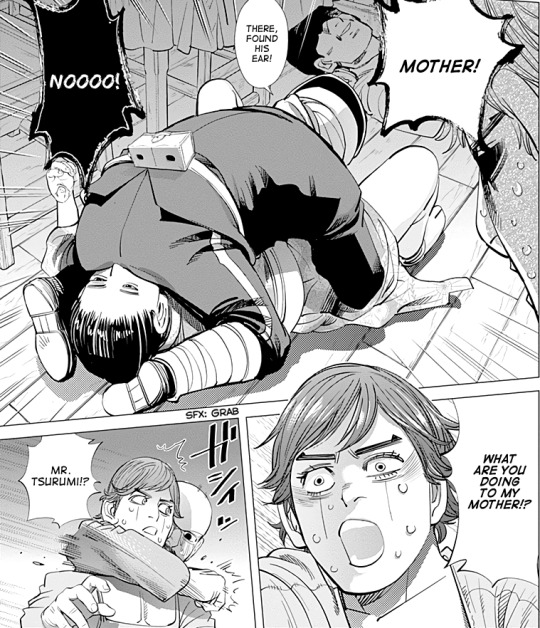
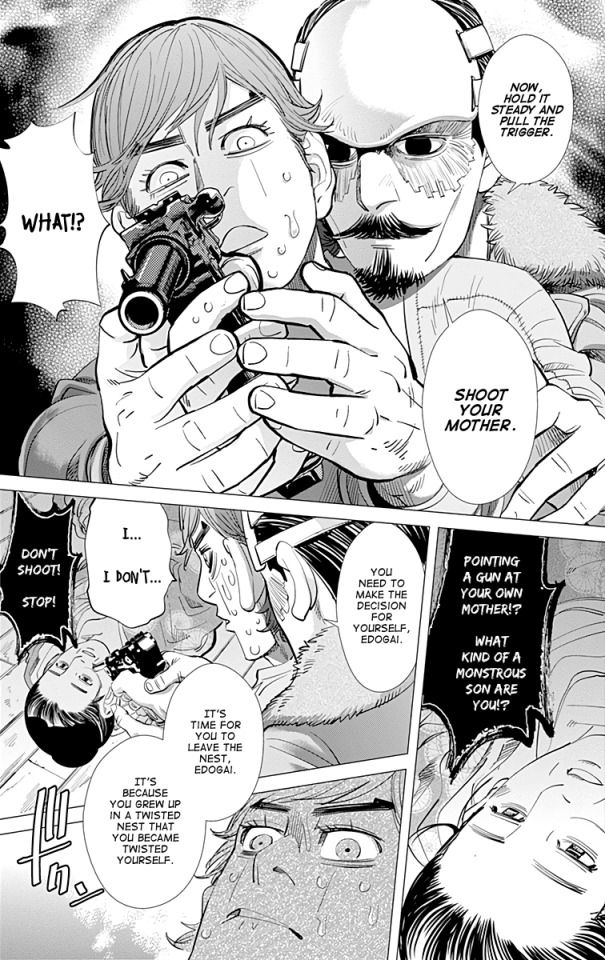

(It’s worth to point out that while the woman is actually dead, in Edogai’s mind, up to that point, she was alive and kicking. Only after he killed her, her voice stopped and he could acknowledge she died previously of a heart attack... but his settling things with her when she was alive, seems to hint at him considering murdering her).
There are undoubtedly many parallels between Ogata and Edogai and they’re even on a cover together...
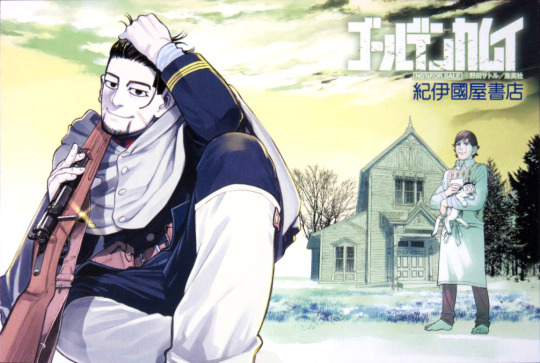
...so it can be that what happened to Edogai foreshadowed what happened to Ogata, who also had an insane mother and who, after saving Shinpei, told him something similar to what Tsurumi said...


Did his grandparents turn abusive like Edogai’s mother and Shinpei’s parents, maybe after Ogata killed his mom? Or just followed Ogata’s mom into her fall in insanity? Or were they merely so old and senile and debilitated by their old age killing them was an act of mercy, an assisted suicide of some sort? Or their death tied somehow to Hanazawa as, most of the times, Ogata’s reasons seems to be tied to the man?
If that’s the case though, it’s interesting how, although he mentioned his grandmother when talking with his father, he didn’t mention how his grandparents too were people he murdered in an attempt to somehow reach Hanazawa, when he had no problems confessing he murdered his own mother and Yuusaku. But of course it’s possible Noda just wanted to keep the dialogue short.
Still, we know if Ogata killed them he had to have a GOOD reason because part of Ogata’s personality is constructed on his belief that there’s a reason for everything, especially for committing murder.


Part because in the same Q&A we’re told:
Q23: “While escaping the hospital in Sakhalin, Ogata had naught but the hospital robe on his back, with his dick in the free, and he seemed to be so cold. Yet when he reappears, he’s wearing clothes. Where did he get them?”
Noda: “An old man caught him in the act of stealing laundry that was hanging outside and let him stay at his place for a while, he fed him too. That man lost a grandson in the Russo-Japanese war. Ogata stayed there for 5 days and then disappeared, leaving a dried cod on the table.” (Translation courtesy of @piduai)
This means Ogata not only didn’t feel compelled to kill the old man but even tried to pay him back for his kindness. If he only wanted to leave his grandparents, he was completely capable to leave them without feeling compelled to kill them, actually in vol 5 he shows he’s generally disliking killing elderly people when he decides not to kill Tanigaki on spot even if it would be more convenient because it would mean to kill Huci as well.
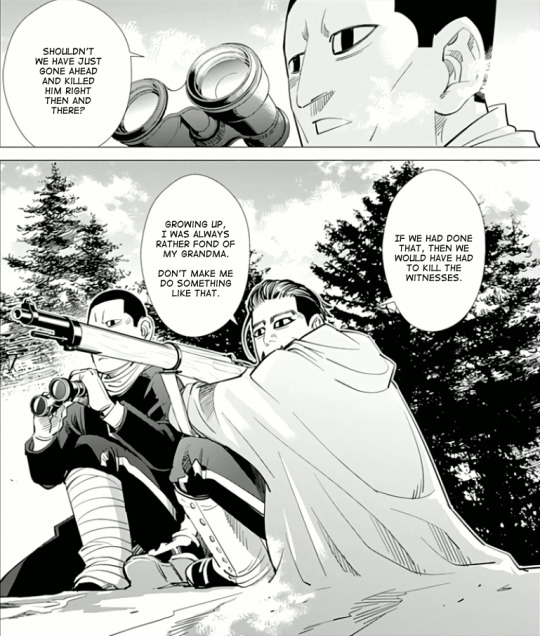
In short, if he is the one who had a hand in killing his grandparents, he should have done it because he BELIEVED he had a GOOD REASON.
On another side he could have been like Edogai, who technically didn’t kill his mother as she died of natural causes. It can be his grandparents’s death wasn’t his fault, maybe they just poisoned themselved for their own reasons or by accident (did they eat poisonous mushrooms for example?) or were killed by someone else but Ogata came back home, found them death of poison and hid the corpses afraid he would be suspected.
And since this wasn’t planned and he had some fondness for them or, at least, for his grandmother, and he was pretty young, he failed to keep a cold head and to make the half eaten food disappear.
Maybe Tsurumi even helped him to forge the story as he did with Usami.



Or Ogata really had no hand in all that and wasn’t even present and found himself to face all that in the same way as Tsukishima found himself to face Igogusa’s disappearance and the whole bit with the half eaten food was merely to keep him wondering if they had been poisoned or if they really had left for unknown destination.
We can’t really say.
My personal belief is that Ogata’s grandparents’ death is a plot point that’s meant to be discussed later on and that’s why Noda was so vague... although it’s also possible it’s a plot point Noda didn’t feel like including in the story, like from where the pelt Asirpa wears came, or how Sugimoto got his boots from the officer he almost killed.
We’ll see. Thank you for your ask!
#Golden Kamuy#Ogata Hyakunosuke#Hanazawa Koujirou#Hanazawa Yuusaku#Ogata Tome#Sugimoto Saichi#Tsukishima Hajime#Koito Otonoshin#Usami Tokishige#Asirpa#Wilk#Ask#Nihei Tetsuzou#Nikaidou Youhei#Nikaidou Kouhei#Edogai Yasaku#Hidoro Shinpei#Hidoro Tamotsu
39 notes
·
View notes
Text
Ramblings and crazy theory time about GK chap 236 “King”
And so in this chapter we learn something important about how someone was…
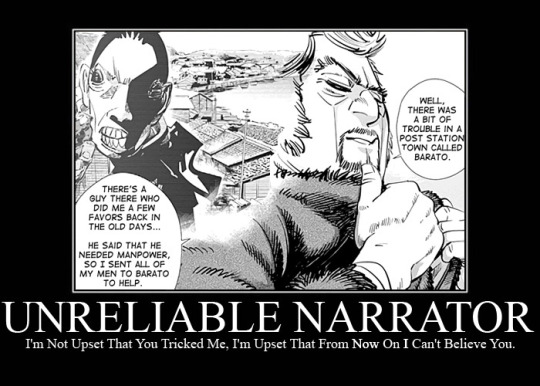
…yeah, an unreliable narrator as there was more than a bit of trouble in Barato and it was caused by a tattooed skin, tattooed skin he left there. Still, kudos to @bloody-fabre for guessing Wakayama was the one to blame for the skin which ended in Barato.
There’s to say the situation is much more complicate than what it looked like when we first met Wakayama and a side of me is very happy that a arc that seemed to go nowhere (the Wakayama arc didn’t seem to have effects on the plot beyond giving Sugimoto an extra skin) is now becoming a relevant part of the plot.
But let’s dig into the chapter.
We resume where we have left, with Boutarou and Sugimoto fighting.
Despite the punch Boutarou doesn’t even let go of his gun but hurries to point it to Sugimoto. Sugimoto however put to good use his experience as a war veteran and grabs the gun in such a way not only he manages to move it slightly away from his face but also takes care to place his hand between the hammer and the bullet, so that when Boutarou pushes the trigger, the gun can’t fire.

Hand-to-hand combat is where Sugimoto excels after all, with tons of life threatening battles on the battleground, surrendered by other soldiers all willing to kill him. It’s in these moments Sugimoto’s six sense and experience, let him find a safe way out in the blink of an eye.
It’s kind of amazing as he just knows how to do.
This is not being a tactician genius though, that requires long term planning. Sugimoto doesn’t have the time to plan, he’s just a man who, when in extreme danger in a hand-to-hand fight, can find the right countermeasure in a blink thanks to his huge experience and talent in this sort of things.
Give Sugimoto two days to think of a plan and he likely will come up with only a vague idea of what to do. Give Sugimoto five second to stop a fatal blow and he’ll come up with the perfect method to stop it and, if possible, to retaliate.
So, now that he has stopped Boutarou from firing, Sugimoto tries to retrieve the gun from himself and at the same time damaging his enemy by attempting to cut away his fingers from it with his bayonet.

Who has good memory might remember Sugimoto doing the same with Nihei, cutting his fingers to stop him from holding his weapon.
(Japanese people knew very well how big of a harm it was to lose fingers, that’s why Yakuza used to cut the pinkie of a Yakuza who failed them, because afterward he would have troubles holding his sword)
Boutarou though isn’t a rookie either.
He’s quick enough to let go the now useless gun, so that all that Sugimoto’s bayonet hit is the gun itself and uses his powerful legs to kick Sugimoto hard enough not only he send him flying against the wooden railing but makes it partially crack. As someone who can jump out of the water like the merman he obviously is Boutarou clearly has strong legs and if he had kicked that way another men, the poor guy might have been sent out of commission.
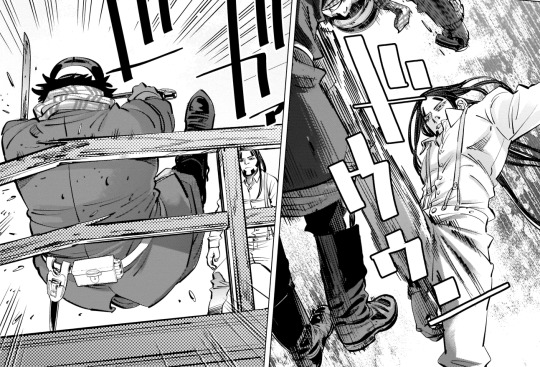
Meanwhile the postman is still shooting like crazy, Boutarou’s accomplice swearing he’ll kill him but, thanks God (or should I say thanks Kamuy?), Asirpa is there to save the day.
She calls him and hurries him to come with her, telling him there’s spare ammunition there, then catches her chance to retrieve Sugimoto’s rifle and kick him off the boat at the same time, forcing him to swim away.
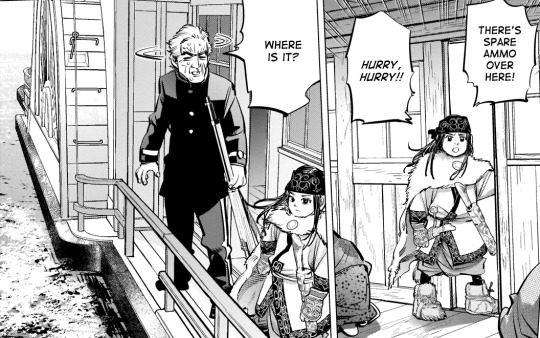

Asirpa is a genius and this constitute as planning as she considered her options, laid out a trap for the postman and put it to work.
Boutarou, on the other side, has recovered his anchor and is tossing it at Sugimoto, who manages to avoid it before Asirpa reaches him. Sugimoto worriedly asks her if she’s hurt.
I wonder if he realized how, while he was busy punishing Boutarou for putting her in danger, he had left her to fend for herself as Boutarou had an accomplice and that postman was completely out of it.
Boutarou’s accomplice informs him the postman has escaped leaving behind the money.
Shiraishi in a scolding tone stops Sugimoto from fighting further, reminding him there’s something they have to ask Boutarou.

This is the problem with Sugimoto losing control and getting himself into battle. In his attempt to ‘avenge Asirpa’ he had left her on her own and has risked jeopardizing his chances to get info out of Boutarou. His actions weren’t a smart move, they were just the result of his feelings overtaking him.
However, after a moment of hesitation, Sugimoto now makes a powerful and rather smart gesture, throwing Boutarou’s gun in the water.
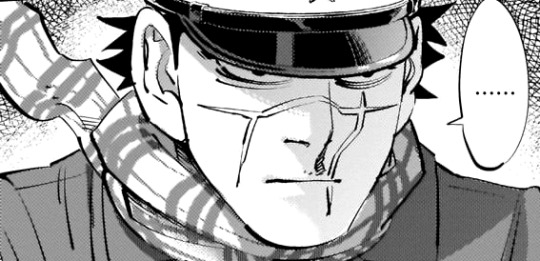
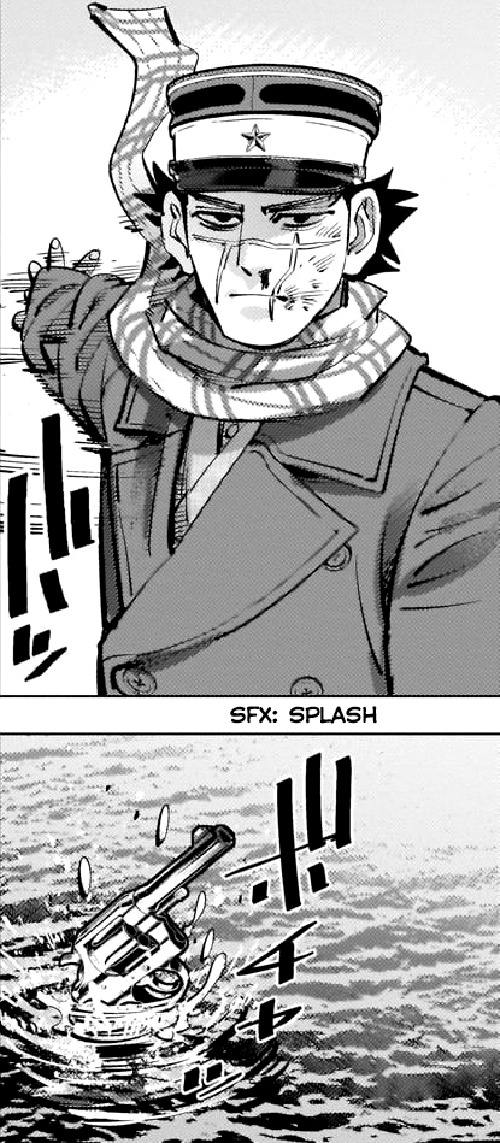
Why is it a powerful gesture?
Because normally it’s assumed that the one with a gun is at a huge advantage toward the one who haven’t it. By tossing it away and therefore by apparently tossing away an advantage, Sugimoto gives a clear demonstration of not having aggressive intentions and only wanting to talk.
Why is it rather smart?
Because Sugimoto is rather bad with firearms and much, MUCH better with his bare hands and therefore for him the gun is more of a disadvantage than a help as it keeps one of his hands busy and, if he were to lose it by mistake, Boutarou could manage to get it back.
Boutarou accepts the truce with another of his smiles, acknowledging Sugimoto by his name. I wonder if his name also rang a bell or he’s just repeating it to make sure he would remember it/got it right.
‘Omae… Sugimoto tte iu no ka’
「お前… 杉元っていうのか」
“You… are called Sugimoto, right?”

We’ll see.
Honestly I doubt Boutarou heard of Sugimoto before but it’s possible. Everyone and their mom know Sugimoto in the 7th so that they could even open a fanclub. People talk and maybe rumours of Sugimoto had reached Boutarou as well. But still i think it’s unlikely, as Boutarou didn’t act as Sugimoto’s name rang a bell.
Meanwhile Shiraishi asks for clarifications about what Boutarou said on how there’s a rumour about how it’s no more possible to solve the code, also asking him if, due to it, he’s no more collecting tattoos.
In the panel we can see clearly Shiraishi and Sugimoto. Asirpa is present too but she’s in it only partially due to her head and due to the ballons covering her partially, hinting at how in a way she’ll be cut out from the discussion even if she saved the day.
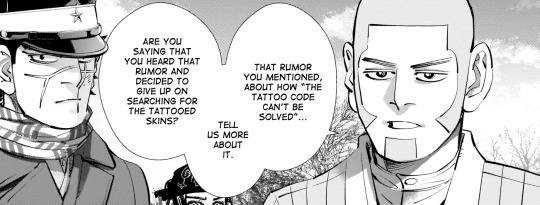
Boutarou tells Shiraishi that a little over one year ago he met Wakayama in Sapporo… and approached him planning to murder and skin him. From the way the scene looks like, with Boutarou naked on a bed, I’ll say his way to approach him, was to try to seduce him.
Wakayama though, evidently realized something was off, had his men encircle him. Among them there’s Nakazawa (princess), while the others are all dressed in black suits with sunglasses (okay, no, they don't have sunglasses, it's just their eyes are so deeply shadowed they seem to wear sunglasses, which fits with the stereotype of Yakuza wearing them so I love Noda's visual choice).
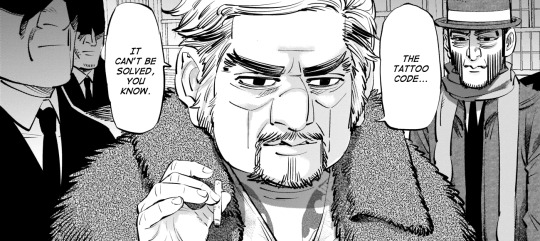
Wakayama tells him that the code can’t be solved. He then explains he killed (and skinned) one of the tattooed men just after he escaped but then dropped by to Barato and left it as a payment for a game he lost.
As he says so we see the same image we saw in the Barato chapter, showing how the Hidoro gang got the skin, but not showing it was Wakayama giving it to them.

As Boutarou asked him why he did so, Wakayama claims the tattooed code can’t be solved because the other convicts might have ended up in the sea and be swallowed by a fish (and at this we’re shown an image of Henmi meeting this fate) or killed by a bear on the mountain (and at this we’re shown an image of Gotou).
Or that a certain weird guy (which I bet is our dear candy seller) might ruin it on purpose.
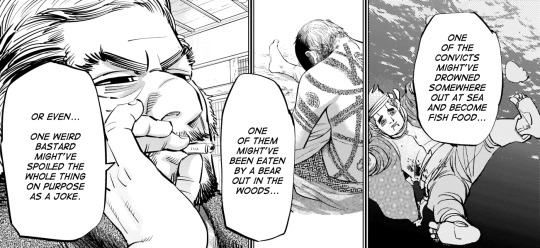
Long story short, Wakayama leaves without skinning him, which convinces Boutarou he was sure that the tattoo code couldn’t be decrypted.
At this Asirpa is reminded of how the candy peddler commented that ‘Boss Wakayama’s disappointed face was pretty great too, though’.
Shiraishi also whispers to Sugimoto that this might be connected to what Asirpa overheard the candy peddler saying, both of them sweating as, after this story, the possibility he was right, seems even more concrete.
And maybe it means nothing but in the panels, even though the group thinks exactly the same thing Asirpa is visually ‘parted’ from Sugimoto and Shiraishi.
They’re in separate panels, the panel with the candy peddler divising them.
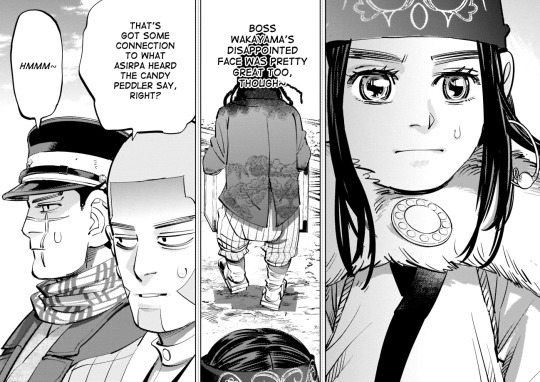
Now… let’s stop a bit and recap what we knew about Wakayama and the Barato skin PRIOR TO THIS CHAPTER.
Time unknown (It could be before Wakayama was arrested or afterward): Wakayama entered a gambling den by chance and was charmed by Nakazawa’s (Hime’s) skill in rolling the dice. After an initial refusal, Nakazawa betrayed his group, ran away to Wakayama’s place, spent a hot night together, but the yakuza pursuers were already outside… we’ve no idea how it ended as Noda interrupted the story here. [Noda Satoru’s Q&A]
FEBRUARY
- Wakayama escapes with the other prisoners… [GK according to Noda begins at the end of February, the convicts, supposedly, escaped a bit sooner than that]
MARCH
- Wakayama with a young man drops by in Sapporo World Hotel. Ienaga locks the younger man in the underground and tortures him, and the guy admits that the man he was with has the same tattoo as Ienaga and is an escaped convict from Abashiri. When Ienaga goes to check on him the morning after Wakayama has disappeared, supposedly planning to go in Hidaka to meet an American named Dun. [The guys went to Ienaga’s hotel in April, she said Wakayama was there a month before] [Chap 55-63]

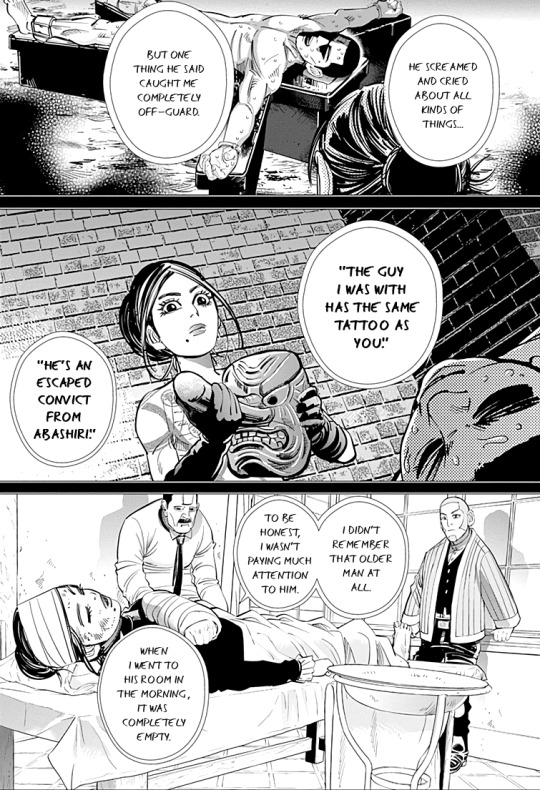
APRIL
- Things escalates in Barato between the Hidoro gang and the Umakichi gang after a guy went to their gambling hall, lost a lot of money and left a tattooed skin as a collateral. Nagakura, Hijikata and Ogata went there and manage to retrieve the skin from Hidoro. [Chap 55-59]

- Wakayama buys horses from Dun [chap 69: When meeting Wakayama again, Dun said he’s the guy who bought horses from him a month before]

- Kiroranke takes part to the Tomakomai race on Wakayama’s horse in place of the jockey who has escaped. However, instead than throwing away the final race he wins it. [Chap 61-62]
May:
- While trying to deal with 3 bears Sugimoto group ends up hiding in the same place in which Wakayama and Nakazawa (Princess) had met the guys who organized the race. Wakayama explains the oddity of him not having men around with sending all of his men to Barato to help a guy in Barato who did him some favors. It’s unclear if the guy is Hidoro or Umakichi but I would say it’s Umakichi as the visual shows him.

It also turns out it was Nakazawa who exposed the heads in plain view because Wakayama cheated on him with a prostitute.
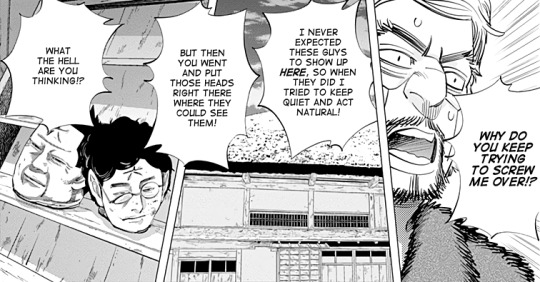
It also turns out the prostitute ended up being killed, although Nakazawa denies killing anyone (was it Jack who killed the prostitute? I wonder... after all Jack kills prostitutes in Sapporo although so far it seems he focused on females).
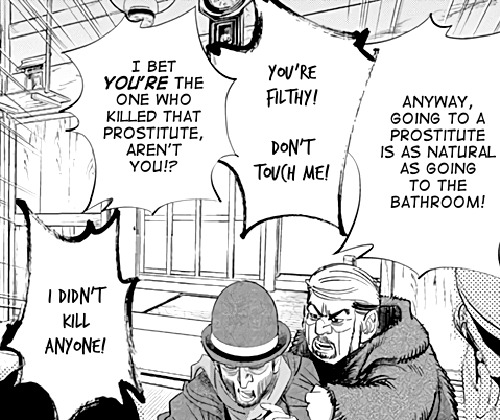
Wakayama complains he should have left him in Sapporo.
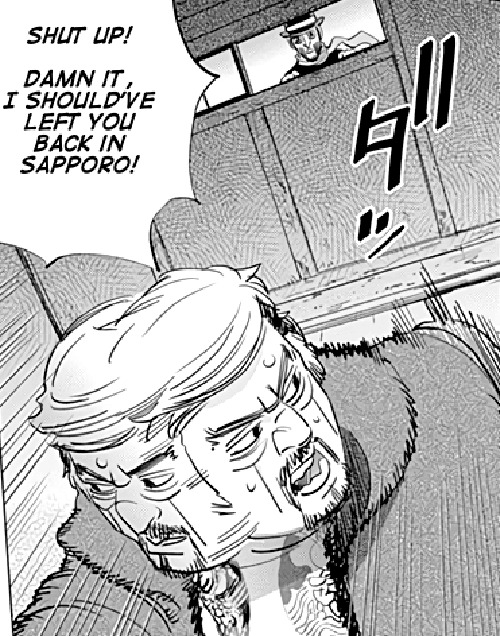
Due to various happening Wakayama and Nakazawa die, Wakayama’s skin ending up in Sugimoto’s hands. [Chap 65-69: Noda said chap 64 is placed in May]
And this is were I thought Noda placed the words ‘THE END’ to Wakayama’s story.
-----------------------------------------------------------------------------------------------------------
Turned out that’s not the case.
In fact, whose info made it look like Wakayama had no interest in the skins, in fact he was back handling his betting business instead than searching for convicts, which made me think it would be weird if he had taken his time collecting a skin and then… dropped it somewhere, as if it were to be useless.
I mean, if he went through the trouble of getting that one skin, I would expect the guy who beat a bear wouldn’t let it go easily.
However this chapter and chapter 233 added some interesting info to Wakayama’s story.
The first is that yes, Wakayama in the beginning wanted to collect the tattooed things but then something, or more likely ‘someone’ (read ‘our dear candy peddler’) persuaded him that it would be impossible to do it, suddenly making the skin he had collected to look worthless.
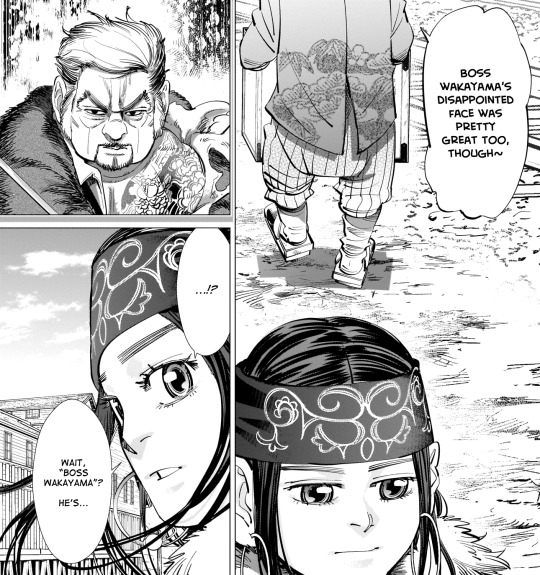
Hence it was possible for Wakayama to have an abrupt change of heart and drop collecting skins.
I wonder if the candy peddler, to persuade him, told him about Henmi’s death, or just showed him he has completely ruined his own tattoo.
Hard to say.
However he and Wakayama likely met pretty early on, likely in March as, by then, while he was in Ienaga’s hotel he was already thinking to go meet Dun to buy horses from him, meaning he wasn’t going to devote all his strength in pursuing convicts but was going back to his horse betting business.
Note that this is just my speculation, I might be completely off and maybe he wanted to pursue both.
We don’t know what pushed him to leave abruptly Ienaga’s hotel, maybe he couldn’t find the man he was with and assumed Nakazawa killed him, or maybe Nakazawa dropped by in his room and he left with him or maybe he was actually penniless and couldn’t pay the bill of the hotel nor the man he came with and left.
Hard to say.
We aren’t even sure back then he was already with Nakazawa as we don’t know when the two met.
However, according to what he says to Boutarou, we’re to suppose he moves to Barato alone, went into a gambling hall, lost a lot of money and left the skin he had with himself as collateral, tattling out the whole tattooed skin matter that could set everyone and their moms hunting for him.
As he did so he clearly didn’t act like a Yakuza boss, Shuhei wasn’t impressed by him and even said they planned to have him work in the fishery, meaning they didn’t realize Wakayama could be a dangerous fighter or even a Yakuza himself.

Why going there alone?
We get he likes to gamble but unless it was Nakazawa who again worked against him as Wakayama complained Nakazawa kept on trying to screw him over it seems weird he would just put himself into a huge debt.
Or did this happen really early on, when Wakayama hadn’t yet managed to reach his underlings?
After all it seems his headquarters are in Sapporo, it can be that moving from Abashiri to Sapporo he just stopped to Barato, which is on the way...
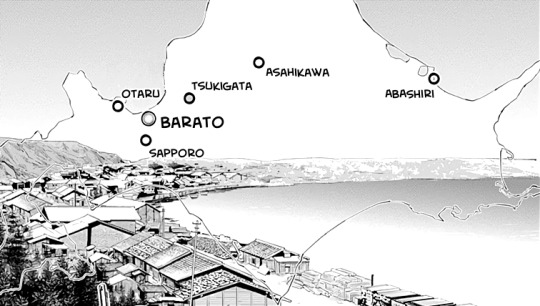
...ended up losing money in the gambling hall and, not wanting to lose face, he hid his own identity.
Anyway, after he left the skin there, he meets Boutarou in Sapporo.
The cover of chap 233 showed Sugimoto and Shiraishi looking at huchen/Adonis flowers, which we know can be observed in April, so if Wakayama and Boutarou’s meeting in Sapporo happened a year before than we supposedly were in April. Boutarou says a little over a year though, so it can be it was in March.
This time Wakayama has plenty of his men around himself, among which Nakazawa.

But figuring out when this meeting exactly takes place becomes hazardous and that’s not the only problem.
When talking with Sugimoto Wakayama declared he went to meet Dun alone because he sent all his men to help someone who helped him in the past (supposedly Umakichi).

As his men were with him when he was in Sapporo we’ve to assume the fight in Barato hadn’t taken place yet (Umakichi will die during it so he can’t really ask for support afterward) so he hadn’t sent his men there yet.
Overall the thing seems to be a bit shaky.
If Umakichi was someone who helped him, why did boss went to bet at Hidoro’s place instead than at a friend’s place? Or was that the moment in which Umakichi helped him? Because Umakichi should have helped him BIG TIME if boss sent ALL HIS MEN to help him… yet he didn’t warn him pursuing that tattooed skin was useless as we know Umakichi was actually pursuing it?
And Umakichi didn’t know Wakayama was also someone who escaped from Abashiri?
Because if he had known sending all his men to help him retrieve the tattooed skin would be dangerous as then Umakichi might try to get Wakayama’s one.
Besides we don’t even see a single man, among the ones with Umakichi, dressed in black suit and tie as Wakayama’s men. Sure, maybe they changed so it’s not big deal but overall the whole thing is weird, so weird even Sugimoto found odd how Wakayama went there alone.
Did Wakayama lie to Sugimoto, whom he knew was searching for the tattooed convicts?
Is there another reason why he sent all his men to Barato but didn’t go there himself?
Or actually he was there also for some other reason than punishing the two at the race (he said he wasn’t expecting Kiro and the others to show up and it makes sense, Wakayama didn’t meet Kiro back then so I’m not even sure if he would have recognized him)?
I don’t know but I’m starting to wonder if we’ll learn more about boss and how that skin ended up in Barato, maybe through Shinpei, who left Barato with Chiyoko and might have transferred temporally to Ebetsu.
It would be interesting to meet Shinpei again as we were never told exactly how his meeting with Ogata ended, we just saw that Ogata gave him a scolding...

...then the scene was cut and we dealt with Hijikata’s group reaching the place, Hijikata and Nagakura getting in to talk with Ogata who now owns the skins, the bodies of Shinpei’s parents nowhere to be seen.
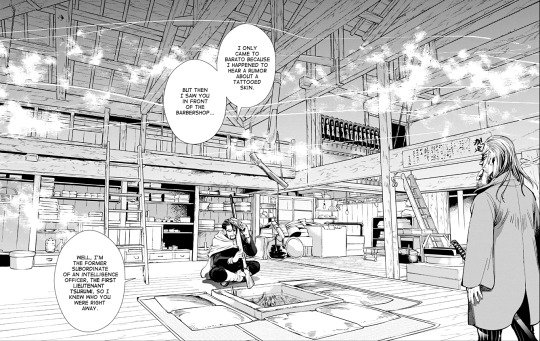
The next we see Shinpei he’s with Chiyoko, first observing the place burning down,
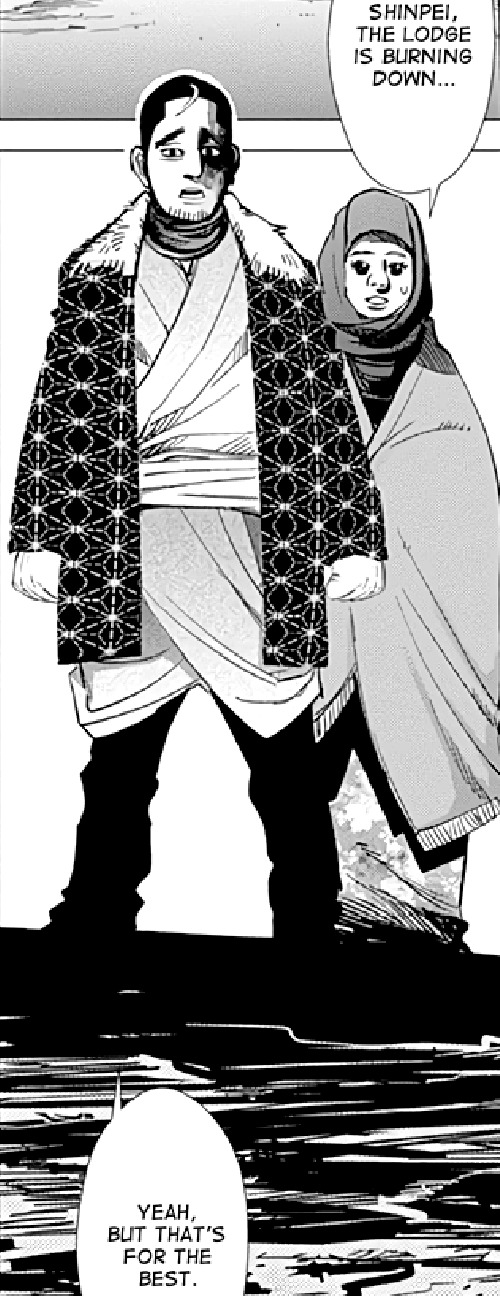
then ready to start a new life with her.
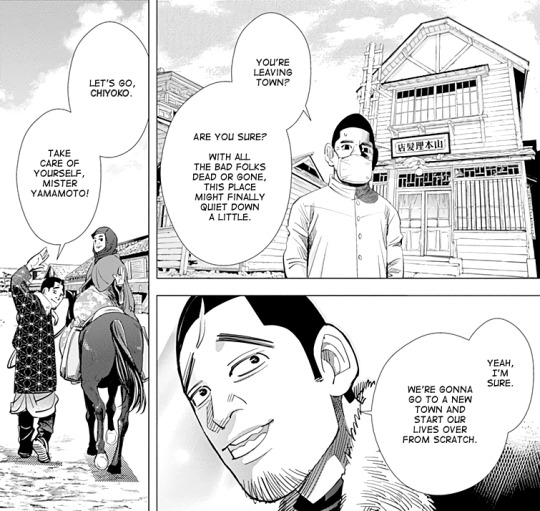
Besides, Shinpei was there when the skin was left to his family, he might tell us exactly how things went and if Nakazawa or the candy peddler were involved and if he knew if Wakayama had a relation with Umakichi.
LOL, overall I’m curious.
When I first read the Wakayama arc it felt like its only purpose was to hand Sugimoto a new skin as it seemed to bring no other development, so now I’m extremely intrigued at the idea there could be more behind it.
And always about Wakayama… what the candy peddler said that made him so sure the tattooed skins can’t be used anymore? Did he ruin his own tattoo? Or, since Wakayama was spot on about a convict ending eaten by a fish and another by a bear someone warned him about Gotou and Henmi’s deaths? Because okay, Gotou’s death is normal enough and one could guess it but Henmi’s death is a bit of a stretch. They were supposed to go to Otaru after all, not go to fish whales or orcas so one of them drowning wasn’t something one should consider a normal occurrence yet it’s the first thing Wakayama comes up with.
But yes, it could also be a lucky guess.
Long story short though… I don’t know anymore which of Wakayama’s words were true and which were a lie, making him an unreliable narrator. I’m only sure that he believed they couldn’t use the tattooed skins anymore to find the gold but that’s it.
I wonder if more will come up in the future.
Back to the story, Boutarou explains that since Wakayama was sure the tattooed skins couldn’t be collected he also decided stopping collecting them.
Shiraishi, clever guy, asks him if he found the place in which the Ainu gold is hidden.
Boutarou though, might act friendly but he’s clearly not a stupid.
He doesn’t directly answer, he just says it’s possible to get close to it but he’s confident Noppera-bou wouldn’t have hid it in a place that’s easy to spot once you get close by.

So Boutarou asks Shiraishi and Sugimoto to join forces with him and help searching for it. He claims he wants Shiraishi in his team because Shiraishi is fun and Sugimoto because Sugimoto is strong and both are things he likes he claims as he wraps his arms around them.
Shiraishi though, using a joking tone, points out they might end up on fighting over how to split the gold.

Boutarou claims they can become his vassals as he wants to become the king of a warm Southeast Asian small island on which he can grow and sell fruits to other countries and have so many kids he can make a country of his own family.

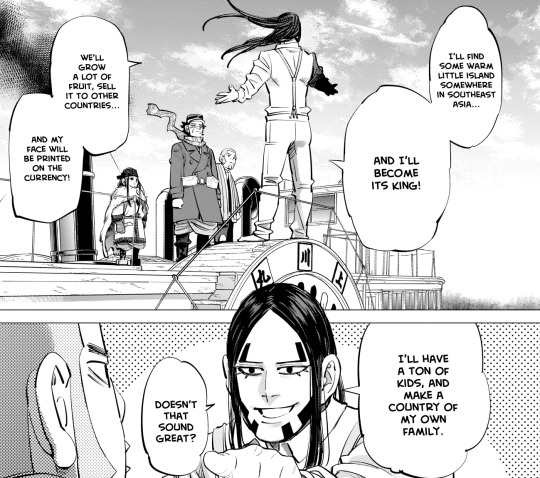
The way Boutarous smiles as he asks them to become vassals in his kingdom is kind of cute, like the one of a happy child.
Shiraishi laughs a bit uncomfortable at his ambitious dream while Sugimoto wonders on why everyone wants to be in charge of something as huge as a country.

He covers his eyes with his hat at this, shadowing them completely even though he smiles, making hard to read his expression. It’s usually no good when Sugimoto’s eyes can’t be seen.
I think Sugimoto believes Boutarou is moved by either ambition or greed or both, therefore by something negative, and that due to this he’s getting in his way when he instead aims at something much smaller and that should also help a person he loves.
I think Boutarou gets what Sugimoto is implying and that’s why, although he keeps his smile he looks much more serious as he makes Sugimoto a personal question.
‘Do you have any family?’
Sugimoto’s face is shadowed and his eyes fully black as he says he doesn’t, Boutarou clearly touching a sore spot.
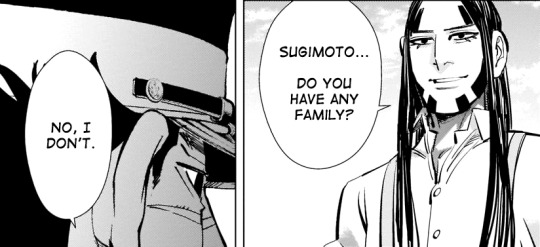
Boutarou goes on, asking him if they’re dead. He’s still smiling but he’s not being overly cheerful.
Sugimoto, also smiling but with his eyes downcast, admits they died due to tuberculosis.
I think that’s the first time Sugimoto talked with someone about how his family died. Sugimoto, Asirpa and Shiraishi are a group but, except for Asirpa who occasionally talk about her father or about Huci, they hardly talk of any personal matter. Credits when its due both Shiraishi and Asirpa tried talking with Sugimoto about personal matters but both stumbled on the Umeko issue (Shiraishi asking him if he had someone and Asirpa asking him what he planned to do with the gold) and Sugimoto closed up to Shiraishi and wasn’t quite honest with Asirpa so talks never went that far… when instead it was probably important they did. They’re risking their life together, they should be able to share the burdens of the pasts with the others.
Anyway at Sugimoto’s reply Boutarou’s smile stay even if his expression is much more serious.
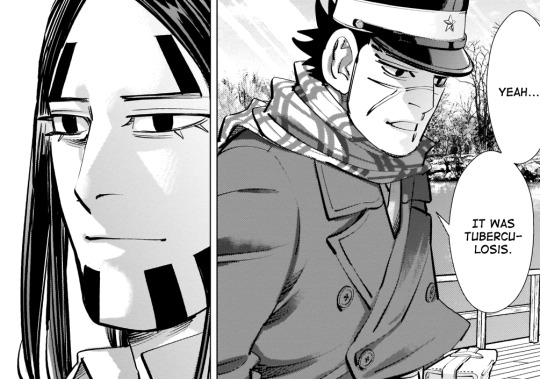
Then Boutarou goes closer to Sugimoto (WOW, Boutarou seems quite a bit taller than him), wrapping his arms around him in some sort of conforting or kinship gesture and telling him his family died too, although what killed them was smallpox, and adding ‘you know what it’s like, right?’.

He’s likely not referring to smallpox but both to the pain of losing your family but also to the sad fate of victims of contagious illness. Places in hospitals were scarce, which means they would have to stay home until one would free, infecting, if they hadn’t already, their family members.
Back then there was no cure for illness like smallpox or tuberculosis same as there is no cure for coronavirus now and they also had a lot less mean to protect themselves from infection.
The result would be that neighbors, in fear of getting infected, would ostracize the families whose members would fall prey of an illness, mock them, claim if they got sick it was because they did it was due to something they had done, as if illness was some sort of divine punishment, abandoning them to their sad fate and refusing to help.
It’s easy to feel empathy for Boutarou and Sugimoto’s conditions, especially considering how even now, in a time in which superstition shouldn’t rule us way too many people had felt entitled to mock or blame or turn their backs to those who would get coronavirus cases.
Boutarou found himself living this situation when he was a child and, as he was a child, he came up with this naïve dream.
‘If I become a king, nobody would ever shun my family.’

For a child this makes sense. He was powerless to fight what was happening so he assumed if he were to be the most important person he would have had control and would have been able to stop the world from rejecting and abandoning him and his family to their fate.
In a way it’s not a completely wrong assumption as we see that people in position of power or with a lot of money can get tested sooner than people who aren’t and they also get better health care, everyone hurrying to find a comfortable place for them in the most comfortable hospital.
Child Boutarou was aware of this as well but instead than thinking that the system was unfair and wanting to fight the system decided he would ride it.
If only who’s in power, who’s rich get help, he would be that person.
A king.
And then he wouldn’t have to suffer that fear and that pain anymore.
This thought helps him to survive.
He decided to stop being afraid of getting smallpox, to pursue his dream and look at the world in a positive manner and this allowed him to carry on to the point that adult Boutarou thinks it was his own attitude that kept smallpox away from him.
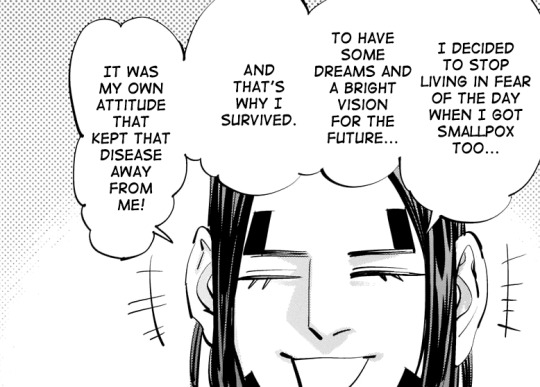
Boutarou makes it simple but it doesn’t really work like turning a switch on. You’ve to persuade yourself that you aren’t afraid, that you’ve to feel positive day after day, wearing these thoughts as if they were a mask that covers fear and negativity until the mask becomes you and you believe in all this… but sadly it’s not so easy and it doesn’t necessarily work smoothly.
Often the mask remains just a mask that stops us from facing what we’re really thinking. Only we’ve been wearing by so long we just delude ourselves the mask is us when it’s always just a mask and, since what’s behind it remains there unchallenged, it slowly poisons our life.
For Boutarou by now it’s probably hard to say if he smiles because he’s genuinely happy or if he smiles because HE MUST BE POSITIVE.
And he’s not the only one who hides behind a smile. We saw how in this chapter Sugimoto too smiled as he said his family died. His smile is a lot less cheery than Boutarou, it’s clear it’s a sad smile but Sugimoto too tries to cope with pain through a smile… although Sugimoto more often than not use it to cover his fear.
We saw him smiling when he punched the bear and it didn’t work, when he faced Tsurumi for the first time he smiled and even joked around even though he knew he was in deep troubles.
Although smiles are usually connected to happiness, they don’t necessarily mean the one showing them feels genuine happiness because they’re also more often than not used as a mask to show confidence, to hide troubles, pain and fear to the others and to yourself.
So I’m not so sure always smiling Boutarou is as happy as he looks like, and I don’t know if his obstinacy in having a positive outlook might cause him to miss facing something negative, becoming a maladaptive behavior. We’ll see but, for now, I think there’s more in Boutarou than just a happy guy, and the same goes for other Golden Kamuy smiling prone characters.
Who knows, maybe as @osomanga has suggested, maybe the funny Shiraishi too has behind himself a sad backstory and let’s not forget the friendly Kiroranke hid behind himself a partisan fighter who had remained alone after he believed Wilk, his hero, betrayed him.
Golden Kamuy is a story with characters with a complicate psychological background after all, we shouldn’t just wave them off as just black and white.
So, back to Boutarou, now we know it’s not greed or ambition what’s behind his wish, but merely a traumatic past that forced him to face on his own the powerlessness of watching your parents and relative die due to a terrible illness and the people turning their back to you.
What Boutarou GENUINELY wishes is fundamentally to never again live that experience, to erase it from the universe but, as this is not possible, he came up with this, with a dream that deludes him he won’t be abandoned, that he will be able to control his fate, that he and his family will be able to live happily.
Not being abandoned, having a measure of control over our fate and live a happy life with our beloved ones are really normal things, things we all wish and that we normally pursue through more normal means but as Boutarou lived in desperate times he decided to use desperate measures.
And, in a way, Boutarou’s dream is overall pretty similar to Tsurumi’s goal and to his men’s dream. They want a country in which they will be safe, happy and in control.
And yes, although what they fundamentally wish is something really normal and human… their wish is sadly a very selfish one as, to fulfill it they would sacrifice other humans. Their world is not a perfect one where everyone is safe, happy and in control but one in which they are.
However, as they perceive they were sacrificed first, they have a hard time realizing sacrificing others is wrong, that they should just accept they were wronged but that it’s not okay to retaliate, to return just retribution for the pain they were made to suffer.
It’s sad. It’s wrong. And it’s also something that happens way too often in life.
As Boutarou explains his dream, Sugimoto’s eyes are still downcast...

...and he remembers himself as he watched over his sick father, Sugimoto’s eyes back then, completely void of light.
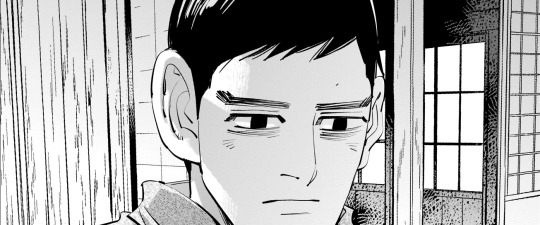
This transition reminds me a bit of the transition Noda used to shift from when Asirpa asked Ogata which was his favourite food to when we saw him with Hanazawa.
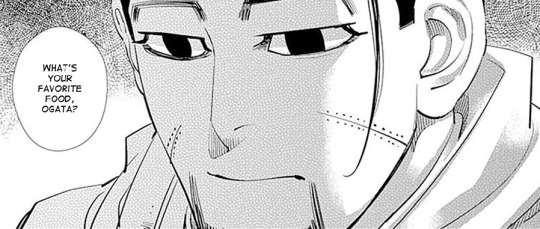

We know that Sugimoto’s father was the last to die, before him Sugimoto lost three other family members.

One of them was likely his mother, the other two are either his grandparents or two younger siblings (Sugimoto’s name implies he’s the firstborn as it contain the kanji for “1”).
His father is probably the last surviving member of Sugimoto’s family and he’s there, sitting at his bedside, watching him slowly die due to illness.
There are many stress lines under Sugimoto’s eyes and his expression is grim. He likely knows there’s no hope, that there’s nothing he can do, that he can only stay there and watch.
Sugimoto’s father tells him not to hope he’ll manage to get a bed in the sanatorium. For who’s not familiar with the term, in a time in which they had no antibiotics against tuberculosis, they assumed you could cure the illness just by giving the ill person a regimen of rest, fresh air and good nutrition. But beds in sanatorium were scarce, that’s way Sugimoto’s father is warning him he won’t get a bed in one… and since sanatorium were assumed to be the only place in which one could heal and he finds unlikely he’ll get a bed in one, basically Sugimoto’s dad is telling Sugi to prepare to the idea of his death.
His father then tells Sugimoto he’s kind and this causes him to end up stuck with the worst roles… same as it used to happen to his father, a personality trait which didn’t seem to want to change.

Sugimoto’s father looks like Sugimoto, only older, thinner and sick. He’s in a bed whose covers are dirty with the blood he should have coughed. The poor guy choughs occasionally but he’s smiling and, contrary to Sugimoto, there’s a light in his eyes.
Sugimoto’s father probably sees the shortcomings of being kind but, at the same time I think he also sees the good sides of it.
It’s not a personality trait that doesn’t want to change, it’s him who didn’t want to change it.
And this makes me think at how it should have been terrible for Sugimoto to accept to kill in order to survive. Because killing is all but kind and he should have made a lot of mental gimmicks to accept to do it and receive a lot of mental scarring.
So of course his reasoning to cope with it is that enemies are soulless bad guys, which Asirpa waved off as an excuse one would give to a child.

Probably a side of him, to protect himself, reverted to a kid and came up with such a silly excuse, same as Boutarou who can’t let go of his childish dream, and then he clung to it and he keeps clinging to it even now, a maladaptive copying mechanism that helped Sugimoto survive the war but that’s now plaguing him, a mask he uses to try to cover the fact he views himself as no more kind as his father said he was.
Sugimoto is a complicate psychological mess and I’m sorry for him because deep down he should be suffering a lot inside and hiding it deep inside himself, covering it with a smile and a kind attitude and not really facing it, which only result in more psychological harm for him.
Again, it’s sad.
The scene changes, Sugimoto is outside of the house and a black cat comes to him.
Contrary to what us westerns say Japanese people back then believed black cats to bring good luck and ward off against illness.
As the cat comes to him to be patted Sugimoto, who has shown through all ‘Golden Kamuy’ to be superstitious enough he even absorbed Ainu superstitions, complains with the cat that the cat was supposed to cure tuberculosis and asks him if this is happening because the cat hardly comes there, therefore making the cat useless. The cat leaves at that, leaving Sugimoto alone to watch him walk away, bringing away with itself even the silly hope the cat could fix everything.
It’s another bit of life experience that forms Sugimoto’s mind, a bit that explains why he’s not very good at cooperating, because back then he could do nothing but entrust his hopes to a black cat and yet he was left alone to deal with it.
Sugimoto stands there as he watched the cat leaving, clearly trying hard not to cry. He’s alone stripped even of the delusion the black cat would magically save his father. No one will help him.
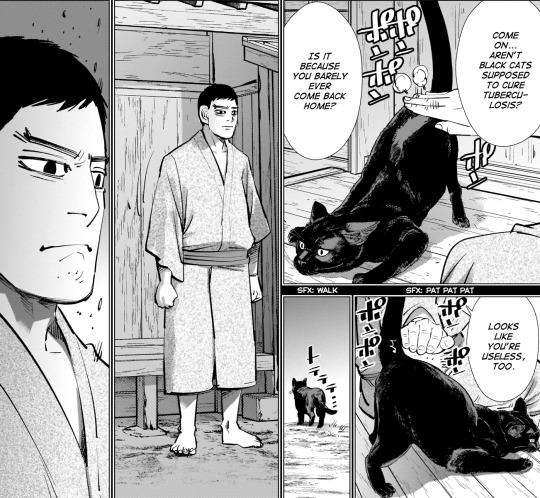
He can’t do anything and no one will help him.
At this point I think he remembers what his father told him, he told him to leave the house and not let himself trapped by tuberculosis. He told him he could live for his own sake, that it wouldn’t be such a bad thing.
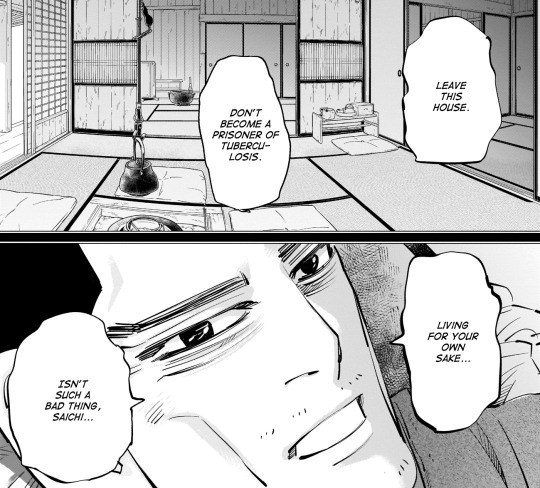
The words, the memory of them after the cat’s abandonment, push Sugimoto to run.
He wants to do it, to escape from that house, but more exactly to escape from that pain. However, as he’s about to get out of the fence he stops, unable to go further.
He looks at the world that extend itself outside the fence, he looks at the freedom, at a place in which he isn’t plagued by the specter of getting infected with tuberculosis each day. He squeezes his eyes shut. In his home his father is still lying in his bed, coughing.
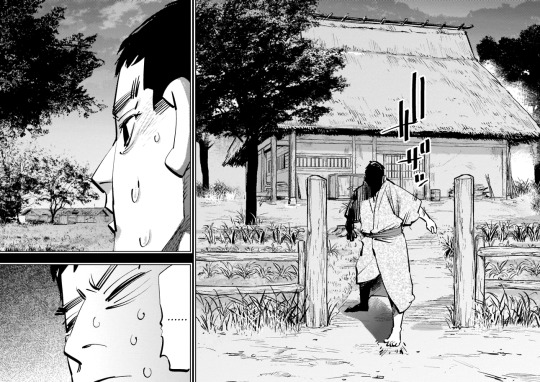
And, I think, at this point Sugimoto knows he can’t leave him to die alone.
In fact in the past flashback we learnt that his father managed to find a spot in a sanatorium… but then he died there and only when the note he was dead reached Sugimoto he managed to leave his home.

So, even though Sugimoto wants to escape, even though he can’t bear it any longer, he can’t leave either. For his torn mind not to crack under the pressure of this two contrasting things, wanting to leave and wanting to stay, his psyche build up a narrative meant to help him to cope.
Sugimoto is a good judoka, isn’t he?
Well, this is a fight, a fight to death against him and tuberculosis, a fight Sugimoto isn’t going to lose. He states he’s going to live and then challenges it to try and kill him, like he will challenge the Russians much later on war, stating he’s immortal.
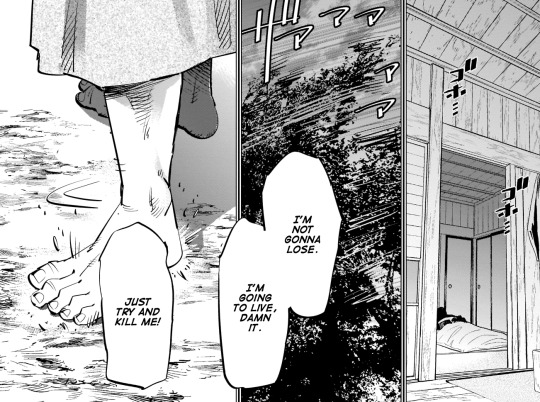
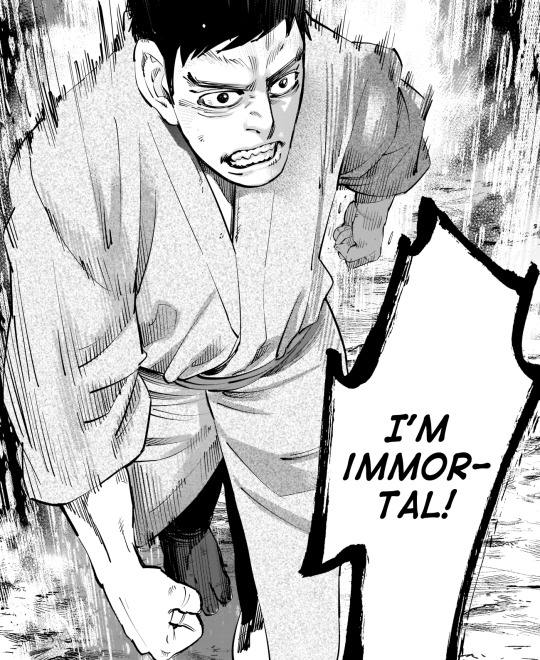
The image depicts him as if his aura was a fire, a fire burning around him but his expression is contracted, ugly. Not as bad as Usami when he murdered Tomoharu but still… ugly.
You can see in it determination… but it’s a forced determination.
Sugimoto is forcing himself to think all those things to overcome his fear.
Telling himself he’s immortal is the copying behavior he has chosen, a behavior that fits with how he’s a fighter at heart but it’s also just a big lie. He’s not immortal and he’s not really facing the realty of the situation, that he’s a mortal taking upon himself a risk.
He’s young, the situation is so traumatic and terrible he simply CAN’T face the truth, but that copying behavior will follow him traumatic situation after traumatic situation, covering his fear behind a wall of fake confidence into something that’s simply not real.
It’s true that a strong will can overcome a weak body, but will can’t do miracles. Sugimoto is a normal person and therefore he can die like any other person. Just because he has more endurance and luck (and a solid plot armor) than others it doesn’t mean all of sudden he’s immortal and this wrong belief might end up doing him more harm than good.
The flashback ends and we go back to present time and to Boutarou, asking Sugimoto what he plans to do once he finds the gold to reach HIS OWN HAPPINESS and if he doesn’t have any dream.
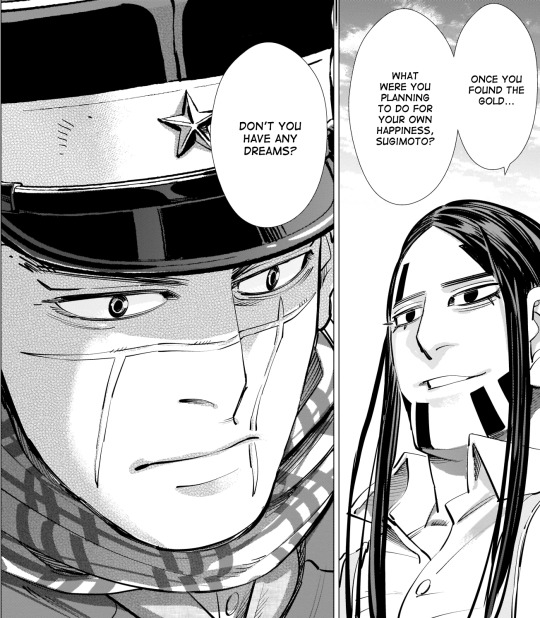
It’s clear Sugimoto started this adventure hoping he could get gold enough for himself to cure Umeko but also to be capable to present himself in front of her as a man who’s better than the one who left her, if not in actions (Sugimoto is plagued by the fact he’s a killer now), at least in finances.
Although Toraji clearly wasn’t rich I always had the feeling he was a little better off than Sugimoto and Sugimoto was afraid this influenced Umeko’s choice... so, since he can’t clean away the blood he has shed I think he hopes he can ‘hide it’ by presenting himself as someone who’s better off economically and can provide Umeko with the means to cure her eyes.
I think he’s afraid to present himself to her but wanted to believe by going back rich and capable to cure her he could find the guts to show himself to her again and get what he truly wanted, her love back.
However many things had happened and more than a full year went by from when he started hunting skins, not mentioning the time that had gone by from when he returned from war.
This goal had moved always further from him while his hunt for the gold became a sidequest that didn’t help him to go back to Umeko but that actually kept him away from her.
So Sugimoto likely knows what he used to dream for when all this started, what he believed would give him happiness… but instead than getting closer with any skin he gained, it only got far. The shading on him isn’t uniform, it’s swirling, I think it hints Boutarou’s words forced him to realize, if not this, at least ‘something’.
Meantime the boat has almost reached Ebetsu.
Boutarou, the gentleman pirate, apologizes to the passengers, telling them he didn’t mean to cause them troubles and commotion so he won’t steal things from them, he’ll just settle for taking the money that was sent as registered mail. As he says so though, he spot Sugimoto opened back with, inside it, Heita’s skin and the tobacco case he always carried with himself.

It doesn’t take a genius to guess this means troubles for his alliance with Sugimoto, Shiraishi and Asirpa… which, to be honest, never got involved in the alliance. Boutarou just wanted Shiraishi and Sugimoto and they didn’t mention having a third member in their group even if it was kind of obvious Asirpa was connected to them.
I’m a little annoyed at this, it’s not the first time Asirpa is handled as a minor part to the group even though today she’s the one who saved the day by handling the problem of the crazy postman (along with Shiraishi who got information from Boutarou and set the basis for an allegiance)… but well, I guess it can’t be helped. We’ll see if things will change in the future.
#Golden Kamuy#Sugimoto Saichi#Asirpa#Shiraishi Yoshitake#Oosawa Fusatarou#Matsuda Heita#Wakayama Kiichirou#Nakazawa Tatsuya#Henmi Kazuo#Golden Kamuy Ramblings and Theories#Hidoro Shinpei#Hidoro Tamotsu#Gotou Takechiyo#Ueji Keiji
22 notes
·
View notes
Note
Oh! I´m happily surprised to see that Noda went with my hunch about Oyabun, thanks for remembering! Also, I think the prostitute Oyabun thinks Hime killed, was the one Ienaga tortured. As for the timeline, I really wish we get canonical chronology of the events at some point, it would help a lot, however I think your approach to it was the closest one yet.
Of course I would remember your theory,
as I said back then it was very interesting!
I’m still wondering if there’s more that Wakayama isn’t saying because if we compare the image that was shown in chap 56 with his own, the two don’t really match.

The guy who gives away the skin seems very short haired like Nakazawa and he also seems to lack sideburns, while boss’ hair is much longer and with prominent sideburns and it were as such in prison also (see chap 172).
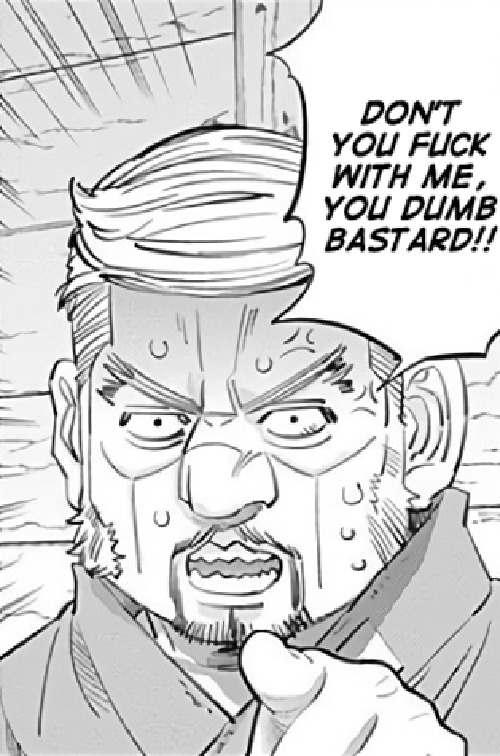
Even if we go and stretch things and assume Noda didn’t give him the right character design, Noda didn’t fix things in the volume in which Wakayama said he did it redrawing him or redrawing the scene from another perspective but, basically, removed the image of the person handing the skin.
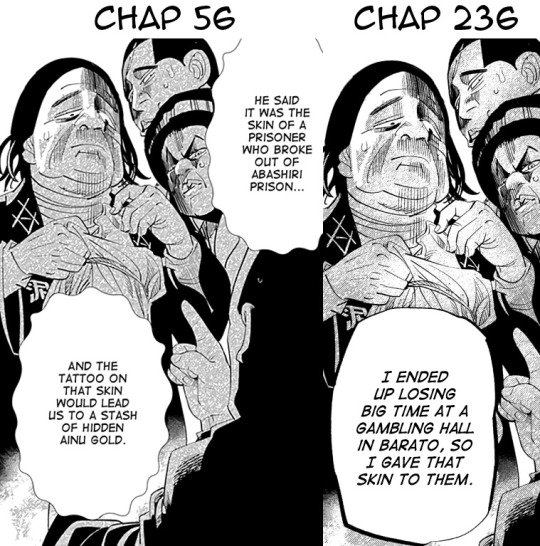
So I wonder if there can be more in this.
I also was sure the prostitute he talked about was the one Ienaga killed... LOL, I’ve even discussed about it recently... because, after all, that seemed the end of Wakayama’s story so it seemed unlikely to assume there was something more in the death of that prostitute.
Now though I’m wondering because the only way Wakayama had to be sure the prostitute was death and not that someone caused him to escape, was for him to see the body... but if Ienaga kept the prostitute in her dungeon to torture him, it’s unlikely Wakayama managed to find the dungeon and see the body or he would have also seen Ienaga torturing him.
Besides quite a lot of time passed between when Wakayama dropped by to Ienaga’s hotel and the time in which he blamed Nakazawa for a prostitute’s death... so it can entirely be that ANOTHER prostitute died in the meantime.
Overall I don’t really know.
Like you, before this chapter, I wa willing to bet the prostitute was the one Ienaga murdered.
I’ve tried more than once to reconstruct the timeline but Noda is very vague with it and there’s probably a retcon in it regarding the Nopperabou incident as in February Asirpa said the Nopperabou incident happened 5 years ago,

however Abashiri takes place in September of the same year, so not even a year after and yet Kadokura had been watching over Nopperabou for 7 years?

Long story short it’s extremely hard to figure when something happened.
Barato for example should have happened in April while the meeting with Wakayama in May... yet from Wakayama’s words the two seem to happen at the same time... so well, it’s a mess.
Noda is probably having a lot of fun letting us guess!
Long story short we can only wait and see, still again congratulation for guessing right and thank you for having shared your theory with me! You’ve been awesome!
#Golden Kamuy#Wakayama Kiichirou#Nakazawa Tatsuya#Ienaga Kano#Hidoro Shinpei#Hidoro Tamotsu#Wilk#Asirpa#Ask#Golden Kamuy Gold Hunt#Kadokura Toshiyuki#Other people's posts#Bloody fabre
8 notes
·
View notes
Note
Now that you mention the skin from barato, I happen to have a theory of my own. As we know, prisoner number one claimed "the convicts started killing each other". Which should by all means leave at least ONE dead convict right off the bat. Also we know Oyabun has been in barato and even left underlings there. And he has killed people. So my little theory here is that Oyabun got one of the skins, trusted it to an underling, and it was "lost" as payment in barato.
Many, many apologies for my lateness in replying but I somehow missed that message.
Now... for your theory...
...the possibility Oyabun/Wakayama Kiichirō had been the one leaving the skin to Barato is rather interesting but now let’s dig into it in details.
To be honest Oyabun doesn’t say he went to Barato, but just that he sent his men there... but it’s possible he went there as well and then left but his men remained there...

If we look at Hidoro Shinpei’s tale though I’m not sure he would play this part.
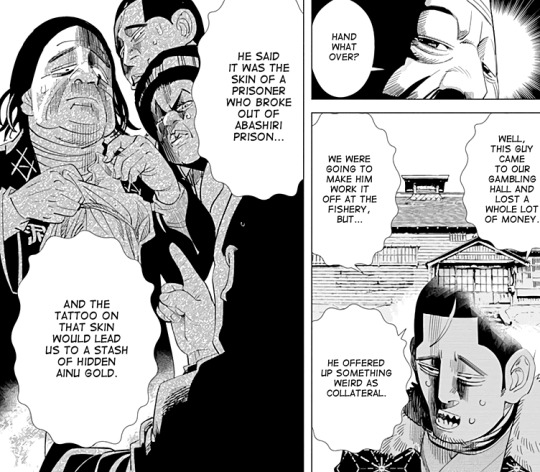
I mean... not only the guy who lost the skin doesn’t really resemble him but I would expect Oyabun not to get himself in such situation and, in case he were, not to surrender so easily the skin.
On the other side we can speculate one of Oyabun’s men was in charge of holding the skin for him and bet it... but it seems the situation between Hidoro and Umakichi escalated DUE to the skin as both Shinpei and Yamamoto (the barber), think the skin is the main reason for Umakichi’s moves.
It’s hard to say but it’s sure an interesting possibility so thank you for suggesting it.
On the other side regarding Prisoner number 1′s words we get into a situation that’s a real mess... both for your theory and in general... but let’s check them first.
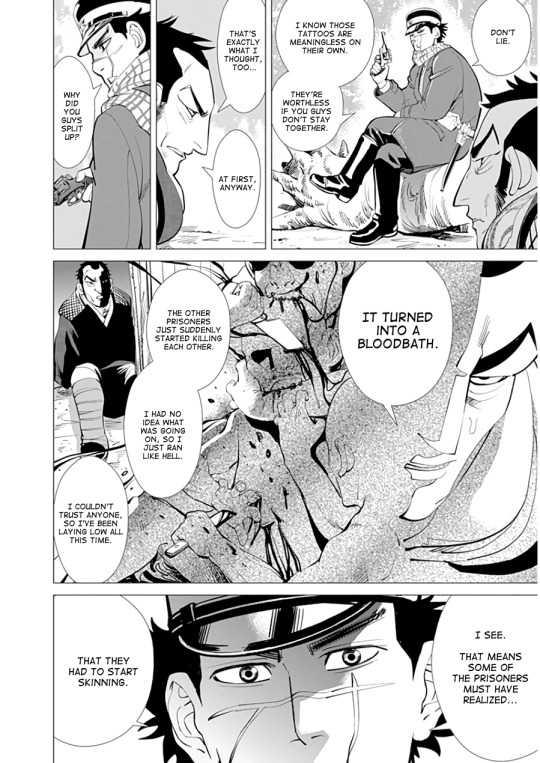

A bloodbath implies that one or more convicts were attacked by one or more convicts.
The image implies convicts jumping on convicts with one convict being stabbed through his eye.
This however generates any sort of troubles.
For start let’s check the possible reasons for which one or more convicts would attach the others.
First of all there’s the reason Sugimoto suggested, wanting to skin them. Not all the convicts though were interested in the skins so let’s divide the convicts in 2 groups, interested and disinterested.
I’ll consider ‘interested’ those who right from the bat started pursuing the tattooed skins or remained in Otaru/very close to it as Nopperabou told them to go there. Those who left for other destinations or only grew an interested when contacted by Hijikata will be labelled as ‘disinterested’.
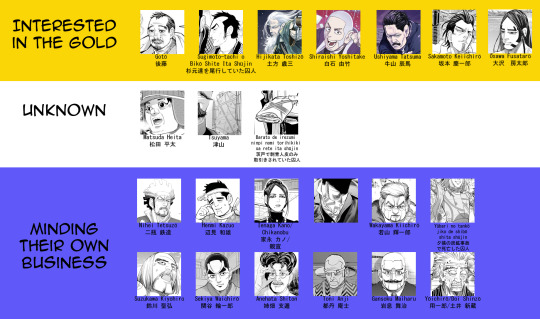
I’ve placed 3 convicts in the unknown section because Heita seems to be forced to cooperate with Boutarou so I don’t know if he’s genuinely interested in getting that particular type of gold, I’ve no idea if Tsuyama was catched near Otaru or not and/or if he expressed interest into the gold and we’ve no idea from where the skin in Barato came.
Everyone else was minding their own (often murderous) business until one of the groups searching for the gold found them.
The result is... basically we have only 4 people who could have started attacking the others for the gold because they possessed the necessary viciousness for it as well as the fighting skills, Hijikata (who so far has proved he was more interested in cooperating and only takes copies of the skins), Ushiyama, Sakamoto (who likely took so long into getting in the gold hunt because first he spent time with O-gin and ended up getting her pregnant) and Boutarou (who, we just learnt, is searching the gold through means different than the skins but this could be an idea that came to him afterward).
As you can see I didn’t place Oyabun in the ‘interested’ group, as not only he leaves Otaru to handle his business but he doesn’t search for the skins at all. Even if we assume yur theory is correct and he got the skin of a convict who died in the massacre or managed to escape to it but died due to his wounds or was even killed by Oyabun for some reason, later Oyabun handed his skin off to pay a debt and didn’t bother to try his hardest to retrieve it, a sign he wasn’t really involved in the gold hunt.
So let’s go to look again to those 4 people.
Could one of them have started a bloodbath?
Highly unlikely.
First of all the idea of a bloodbath would involve people seriously wounded or murdered. So far we only have one known deceased who might not even have died in such a circumstance.
none of the overmentioned 4 at the time was in an allegiance with other people so if he wanted to attack it would be 1 against everyone else... and many of the convicts are seriously dangerous.
We know Nihei got his hands on a rifle and with or without one he’s a dangerous foe. If Henmi were to put his hands on one wof the soldiers weapon (we don’t know if he did or not) he would be equally dangerous in a fight. Oyabun also is someone you don’t want near to a sword and the same goes for Youichirou. There’s Gansoku that’s pure brutal strenght.
If one of the overmentioned 4 would attack the others the others would likely gang up on him not escape. And if a fight among such powerful guys were to ensure yes, we would have had a bloodbath but also more than 1 dead convict.
Overall I think the whole thing ended up being retconned, in fact he doesn’t come up again in the following volumes, Noda introduced the idea the convicts didn’t see each other faces and didn’t know each other except for some guys who were popular or were closed in a jail together and so on (not even Hijikata knew them even if according to Shiraishi HE was the one who passed down the plan to them all).
This of course allows things like Shiraishi not realizing Wakayama was a convict or Hijikata having to ask Kadokura info about the convicts so the retcon wasn’t a bad idea... but when we go and try to figure out what happened during the convicts’ escape of course we get stumbled because the bloodbath got somehow erased.
Retcons happen, especially in works like GK and this one is a minor one.
At least this is the most likely Doylist explanation.
A Watsonian one can be that Prisoner number 1 misunderstood the situation.
If they actually ganged up on a single convict because that one was dangerous, he might have assumed the convicts were brutally slaughtering each other when instead they were attacking just one convict in self defence. The guy would be the one who ended up as a skin in Barato. The problem with this theory is it wouldn‘t explain why the convicts then escaped in different directions, if they had murdered the threat and it was more convenient for them to stay together. Surely, even if they didn’t want the gold, Hijikata would have demanded a copy of their skin before letting them go.
Another possibility is Heita lost it, the convicts knew he wasn’t responsible for his actions so, although he managed to kill a convict, he ended up not murdered by the others but just knocked out... or he went back to normal. Again we stumble back in the same problem as before. Once gotten the situation under control, why escaping? If Hijikata had exposed his plan Ushiyama and Toni would have joined him as they did later.
Last but not least, it’s possible the convict starting the fight is one we hadn’t met yet.
Still, with only 1 convict ending up dead, I find calling it a bloodbath was an huge exaggeration.
We’ll see... but so far I tend to think Noda just retconned the bloodbath and we’re meant to suspend our disbelief and just pretend to forget it... still thank you for your interesting suggestion! I’ll look forward to see if it’ll be proved to be true!
#Golden Kamuy#Wakayama Kiichirou#Hidoro Shinpei#Hijikata Toshizou#Ushiyama Tatsuuma#Sakamoto Keiichirou#Oosawa Fusatarou#Matsuda Heita#Shiraishi Yoshitake#Nihei Tetsuzou#Henmi Kazuo#Ienaga Kano#Suzukawa Kiyohiro#Sekiya Waichirou#Anehata Shiton#Toni Anji#Gansoku Maiharu#Youichirou#Ask#Golden Kamuy Gold Hunt#Gotou Takechiyo#Kasahara Kanjirou#Other people's posts#Bloody fabre
7 notes
·
View notes
Text
How are the characters called? (Vol 1 to 6)
(UPDATED! This new version covers till Vol 6 of the manga. New characters were added (Chiyoko, Ejiri Matasuke, Hidoro no Okami, Hidoro Shinpei, Hidoro Tamotsu, Ienaga Kano, Kamezō, Kantarō, Kiroranke, Komiya, Kusuda Umakichi, Mishima, Nishin Daijin, Yamamoto, Yodogawa Terunaka) and previous characters were expanded. Please, enjoy this new version as well!).
So, since I’m making a re-reading I thought to take advantage of it to check how the characters call themselves and each other as this goes often lost in the translations but can turn relevant later on.
By the way, in order to do this:.
- characters will be listed by their own name (regardless of it being used in the volume).
- in case of characters whose name is still unknown, I’ll use the Japanese labelling given to them for the Golden Kamuy contest.
- if a character appears in the volume but has no speaking role I’ll only list his name and update it with new info when I’ll do the following volumes (yes, even if I know the new info already… I’m trying to keep this ordered).
- the way characters addressed to themselves will be listed and so will the various form of ‘you’ they use to talk with other people.
- for soldiers their ranking, if known, will be listed.
- in case of nicknames they’ll be listed as well.
- next to each way of calling themselves/the others will be listed the number of the chapter when this happened for the first time.
- at the bottom you can find some useful explanation on the various way to say ‘I’, ‘you’ and the suffixes character use.
So let’s go on and see how the characters called each other in Vol 1-6 (which covers chap 1-59).
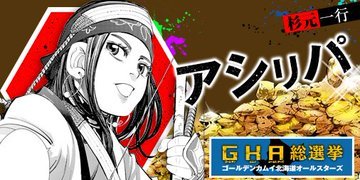
Asirpa (アシㇼパ)/Kochōbe Asuko (小蝶辺 明日子) - Previous name: Ekasiotonpuy (エカシオトンプイ).
Asirpa: She uses ‘Watashi’ (わたし/私 “I”) to talk about herself (Chap 2). She defines herself an ‘Atarashī jidai no Ainu no onna’ (新しい時代のアイヌの女 “Ainu woman for a new era”) (Chap 12). After being reunited to Sugimoto after he’d been captured she comments he had treated her like a ‘Kodomo’ (子供 “Child”) and had refused to trust her as his ‘Aibō’ (相棒 “Partner”) (Chap 20).
Asirpa & others: She uses ‘Watashi-tachi’ (わたしたち “We”) to talk about herself and Shiraishi and Sugimoto (Chap 28).
Gotō: Well, they don’t really get to talk so she refers to him simply as ‘Sono otoko’ (その男 “This man”) (Chap 1).
Henmi Kazuo: She calls him ‘Shūjin’ (囚人 “Prisoner”) (Chap 38).
Huci: She calls her ‘Huci’ (フチ Ainu word for “Grandmother”, which the Japanese translation translates as Obāchan’, おばあちゃん) (Chap 11).
Kiroranke: She calls him ‘Kiroranke Nispa’ (キロランケニㇱパ Ainu word for “Mister Kiroranke”) (Chap 47) and defines him as ‘Chichi no mukashi no yūjin’ (父の昔の友人 “Her father’s old friend”) (Chap 47).
Makanakkuru: She calls him ‘Acapo’ (アチャポ Ainu word for “Uncle” , which the Japanese translation translates as ‘Ojisan’ 叔父さん) (Chap 38).
Nihei Tetsuzō: When talking about him, Asirpa calls him ‘Nihei Tetsuzō’, saying she heard his name before (Chap 26). Saying they’ll catch him so they’ll protect Retar she calls him ‘Shūjin’ (囚人 “Prisoner”) (Chap 26). Watching Nihei aiming at something, she calls him ‘Ano Otoko’ (あの男 “That man”) (Chap 27) and when she can’t believe how tenacious he is, she calls him ‘Sono Otoko’ (その男 “This man”) (Chap 28).
Osoma: She calls her ‘Osoma’ (Chap 12).
Retar: She calls him ‘Retar’ (Chap 2). She also calls him ‘Horkew Kamuy’ (ホㇿケウカムイ Ainu word for “Wolf god”) (Chap 11) or ‘Omae’ (おまえ “You”) (Chap 14).
Ryū: When saying she won’t let him behind, she calls him ‘Ainu Inu’ (アイヌ犬 “Ainu dog”) (Chap 29). When he’ll show up while they’re hunting she calls him ‘Ryū’ and when he smells the scent of a bear and would like to follow it she calls him ‘Īko’ (いい子 “Good boy”) (Chap 36).
Shiraishi Yoshitake: In the beginning she keeps mispronouncing his nickname, calling him ‘Dappun-ō’ (脱糞王 “Defecation king”) (Chap 17) though she also uses ‘Omae’ (おまえ “You”) to call him (chap 15). When he tries to escape from her and fail though, she uses his true nickname ‘Datsugoku-ō’ (脱獄王 “Escape king”) (Chap 17). When claiming she has not much worth to him she calls him ‘Ano Otoko’ (あの男 “That man”) (Chap 28). She finally calls him ‘Shiraishi’ when he tosses the rifle on the ground (Chap 28). Telling him he has to stay because he’ll be of use to her she calls him ‘Omae’ (お前 “You”) (Chap 32). Finding him drunk and asleep she calls him ‘Yakudatazu no Shiraishi’ (役立たずの白石 “Useless Shiraishi”) (Chap 34) and ‘Kitanai otoko’ (汚い男 “Filthy man”) (Chap 34). After he gives Asirpa info about Henmi she claims she believed he was ‘Nonda kure teru tada no buta’(飲んだくれてるただのブタ “A drunken pig”) but now she had revalued him (Chap 38). When Shiraishi will say he’ll help them to meet Nopperabō she switches from calling him ‘Dappun-ō’ (脱糞王 “Defecation king”) to ‘Datsugoku-ō’ (脱獄王 “Escape king”) (Chap 49).
Sugimoto Saichi: In the beginning she uses just ‘Omae’ (お前 “You”) to call him (chap 1) and she’ll also refers to him as ‘Sisam’ (シサㇺ Ainu word for “not-Ainu Japanese person”) (Chap 2). Then she’ll starts to call him ‘Sugimoto’ also (Chap 2), though occasionally she’ll still call him a ‘Sisam’. She’ll call him ‘Fujimi no Sugimoto’ (不死身の杉元 “Sugimoto the Immortal”) when she’ll ask him what that nick means (Chap 5) though. She calls him ‘Baka’ (バカ”Stupid”) when he forgets his knife and bayonet (Chap 13). When asked by Kirokante why she’s with him she answers he’s her ‘相棒’ (Aibō “Partner”) (Chap 48)
Tanigaki Genjirō: When thinking Tanigaki might be still searching her she calls him ‘Ano Heishi’ (あの兵士 “That soldier”). When she says she doesn’t know if he’ll survive she calls him ‘Sono Otoko’ (その男 “This man”) (Chap 28). Entrusting her grandmother to him she calls him ‘Tanigaki’ (Chap 50).
Ushiyama Tatsuma: The first time she sees him she calls him ‘Sinna kisar’ (シンナキザㇻ Ainu word for “Strange ears”) (Chap 52). After he tells her which sort of man she has to pick she calls him ‘Sensei’ (先生 “Teacher”) (Chap 52). Escaping from the hotel she calls him ‘Chinpo Sensei’ (チンポ先生 “Professor penis”) (Chap 54).
Wilk: She calls him ‘Aca’ (アチャ Ainu word for “Father” , which the Japanese translation translates as ‘Otōsan’ お父さん) (Chap 14). When she can’t believe he’s the person in jail she refers to the person in jail as ‘Nopperabō’ (のっぺらぼ “Faceless male”) (Chap 48). When she wonders if he could be her father she calls him ‘Watashi no chichioya’ (私の父親 “My father”) (Chap 49).
Others: Talking about how she had to roast meat for Shiraishi and Sugimoto she calls them ‘Omae-ra mitaina tokai no moyashi-kko’ (お前らみたいな都会のもやしっ子 “You, little city boys”) (Chap 25).
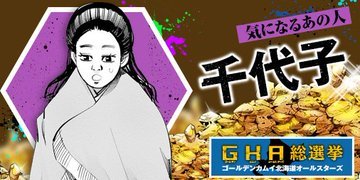
Chiyoko (千代子) .
Hidoro Shinpei: She calls him ‘Shinpei-chan’ (新平ちゃん “Dear Shinpei”) (Chap 59).
Nagakura Shinpachi: She calls him ‘Ojīchan’ (お爺ちゃん “Old man”) (Chap 57).
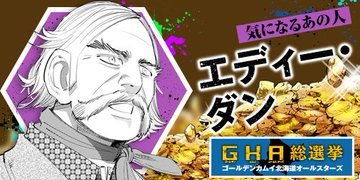
Dunn, Eddie (エディダン “Eddie Dunn”).
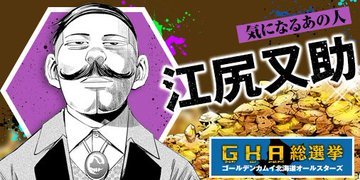
Ejiri Matasuke (江尻 又助).
Ejiri Matasuke: He uses ‘Ore’ (俺 “I”) to talk about himself (Chap 56).
Ogata Hyakunosuke: He calls him ‘Chinpira’ (チンピラ “Thug”) (Chap 56) (Chap 56).
Others: He calls Hijikata and Nagakura ‘Osamurai-san’ (お侍さん “Mister Samurai”) (Chap 56) (Chap 56)
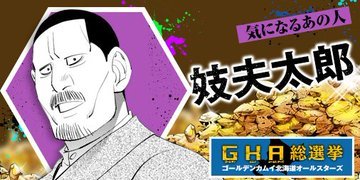
Gifutarō (妓夫太郎 “Pimp”).
Gifutarō: He uses ‘Ore’ (俺 “I”) to talk about himself (Chap 15).
Asirpa: He calls her ‘Ainu no gaki’ (アイヌのガキ “Ainu brat”) first, ‘Ainu no onna’ (アイヌの女 “Ainu woman”) short after and, when Asirpa hits him, ‘Kono kuso gaki’ (このクソガキ “this goddamn brat”) (Chap 3).
Shiraishi Yoshitake: Seeing him he calls him ‘Danna’ (ダンナ “Mister”) (Chap 33).
Sugimoto-tachi o Bikō Shite Ita Shūjin: He calls him ‘Otoko’ (男 “Man”) (Chap 3).
Sugimoto Saichi: He calls him ‘Omae’ (お前 “You”) (Chap 3) but later he switches to ‘Anta’ (あんた “You”) (Chap 15).
Ushiyama Tatsuma: Learning he’s the one who hurt a prostitute he calls him ‘Ano yarō’ (あの野郎 “That guy”) (Chap 33).
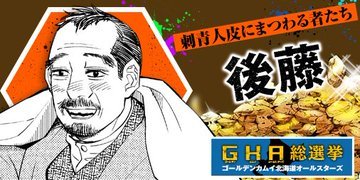
Gotō (後藤).
Gotō: He uses ‘Ore’ (俺 “I”) to talk about himself (Chap 1).
Sugimoto Saichi: He calls him first with his full name ‘Sugimoto Saichi-san’ (杉元佐一さん) then just ‘Sugimoto-san’ (杉元さん) or ‘Anta’ (あんた “You”). He also mentions how people during war used to call him ‘Fujimi no Sugimoto’ (不死身の杉元 “Sugimoto the Immortal”) but doesn’t use this nick (Chap 1).
Wilk: He calls him just ‘Otoko’ (男 “Man”) (Chap 1).
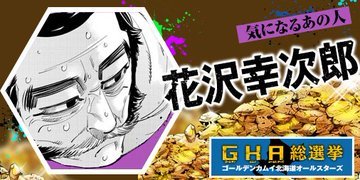
Hanazawa Kōjirō (花沢幸 次郎) - Rank: ‘Chūjō’ (中将 “Lieutenant General”).

Henmi Kazuo (辺見和雄).
Henmi Kazuo: He uses ‘Boku’ (僕 “I”) to talk about himself (Chap 38) but claims he gives off the scent of a a ‘Hitogoroshi’ (人殺し “Murderer”) (Chap 39).
Asirpa: He calls her ‘Ainu no musume-san’ (アイヌの娘さん “Miss Ainu girl”) (Chap 39).
Henmi Kazuo no Ototo: He calls him ‘Ototo’ (弟 “Younger brother”) (Chap 39).
Nishin Daijin: He calls him ‘Oyakata’ (親方 “Master”) (Chap 39).
Shiraishi Yoshitake: He will refer to him as ‘Shiraishi Yoshitake-san’ (白石由竹さん) (Chap 39).
Sugimoto Saichi: At first he will refer to him as ‘Kono Heitai’ (この兵隊 “This soldier”) and as Shiraishi’s ‘Nakama’ (仲間 “Comrade”) (Chap 39). After Sugimoto gives him a cover he’ll say of him ‘Yasashina… kono hito’ (やさしな… このひと “So gentle… this guy”) (Chap 39). However he will comment Sugimoto gives of the same scent he has, the one of a ‘Hitogoroshi’ (人殺し “Murderer”) (Chap 39). He then in this thoughts will calls him ‘Ano hito’ (あのひと “That guy”) and ‘kono hito’ (この人 “this guy”) (Chap 39). When asking him which hammer he would like to use he starts to call him ‘Sugimoto-san’ (杉元さん) (Chap 40). When the soldiers will ask if that man was Sugimoto though, he’ll call him just ‘Sugimoto’ (Chap 40). When about to fight him he asked him if he was called ‘Fujimi no Sugimoto’ (不死身の杉元 “Sugimoto the Immortal”), then to refer to him used ‘Anata’ (あなた “You”) (Chap 41). When Sugimoto suggest they could gleam together he’ll call him ‘Suteki na hito’ (素敵なひと “Wondeful person”) (Chap 41).

Hidoro no Okami (日泥の女将 “Hidoro’s proprietress”).
Chiyoko: She calls her ‘Onna’ (女 “Woman”) (Chap 57). Later she’ll call her ‘Chiyoko’ (Chap 59).
Hidoro Shinpei: She calls him ‘Musuko’ (息子 “son”) (Chap 56) and defines him a ‘Funuke’ (腑抜け “Coward”) (Chap 56). Talking to him she calls him ‘Shinpei’ (Chap 56) and ‘Anta’ (あんた “You”) (Chap 59).
Hidoro Tamotsu: She calls him ‘Anta’ (あんた “You”) (Chap 59).
Kusuda Umakichi: She calls him ‘Umakichi’ (Chap 57).
Nagakura Sinpachi: She calls him ‘Anta’ (あんた “You”) (Chap 57).
Yamamoto: She calls him ‘Yamamoto-san’ (山本さん “Mister Yamamoto”) and asks him since when he became ‘Umakichi no Kobun’ (馬吉の子分 “Umakichi’s underling”) (Chap 57).
Others: She calls Hijikata and Nagakura ‘Osamurai-san-gata’ (お侍さん方 “Mister Samurai (Plural)”) (Chap 56) and then ‘Otsure’ (お連れ “Companions/guests”) (Chap 56). She calls Hidoro Shinpei and Hidoro Tamotsu ‘Anta-ra’ (あんたら “You (Plural)”) (Chap 57)

Hidoro Shinpei (日泥 新平).
Hidoro Shinpei: He uses ‘Ore’ (俺 “I”) to talk about himself (Chap 56) but defines himself a ‘Okubyōmono’ (臆病者 “Coward”) (Chap 57).
Chiyoko: Talking about her with Hijikata and Nagakura he calls her ‘Mekake’ (妾 “Mistress”) (Chap 56) but with her he uses ‘Chiyoko’ (Chap 56).
Ejiri Matasuke: He calls him ‘Ejiri shochō’ (江尻署長 “Chief Ejiri”) (Chap 57).
Hidoro no Okami: He calls her ‘Okkā’ (おっ母 “Mother”) (Chap 56).
Hidoro Tamotsu: He calls him ‘Oyaji’ (オヤジ/親父 “Dad”) (Chap 55). When they argue he calls him ‘Anta’ (あんた “You”) (Chap 59)
Kusuda Umakichi: He calls him ‘Umakichi’ (Chap 57) and says he was Hidoro’s ‘Oyaji no migiude’ (オヤジの右腕 “My father’s right hand man”) (Chap 57).
Yamamoto: He calls him ‘Yamamoto’ (Chap 59).
Others: He calls Hijikata and Nagakura ‘Boke rōjin’ (ボケ老人 “Stupid old men”) (Chap 55), ‘Jijī’ (ジジイ“Old men”) (Chap 55) and ‘Toshiyori’ (年寄り “Old people”) (Chap 55). When he asks for their help he calls them ‘Osamurai-san’ (お侍さん “Mister Samurai”) (Chap 56).

Hidoro Tamotsu (日泥 保).
Chiyoko: He calls her ‘Chiyoko’ (Chap 57).
Hidoro Shinpei: He calls him ‘Kono yarō’ (この野郎 “Bastard”) (Chap 59), ‘Temē’ (テメエ “You”) (Chap 59).
Others: He calls Hijikata and Nagakura ‘Anta-ra’ (あんたら “You (plural)”) (Chap 55).
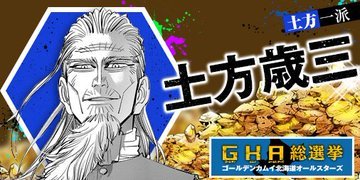
Hijikata Toshizō (土方 歳三) - Nicknamed ‘Oni no Fukuchō’ (鬼の副長 “Demonic vice-commander”), ‘Bakumatsu no Baragaki’ (幕末のバラ餓鬼 “Lingering ghoul of the Bakumatsu”), ‘Baragaki’ (バラガキ “Brat with a thorny personality”) and called ‘Danna’ (旦那 “Boss”) by his underlings.
Hijikata Toshizō: He uses ‘Watashi’ (私 “I”) to talk about himself (Chap 21). He also refers to himself as an ‘Ikinokori’ (生き残り “Survivor”) (Chap 55).
Asirpa: He defines her a ‘Menkoi ko’ (めんこい子 “Handsome little lady”) (Chap 43). He then calls her ‘Asirpa-chan’ (アシリパちゃん) (Chap 44). Asking about her to Kirokanke he calls her ‘Kochōbe Asuko’ (Chap 48).
Kusuda Umakichi: He calls him ‘Umakichi’ (Chap 56).
Hidoro no Okami: He calls her Shinpei’s ‘Okkā’ (おっ母 “Mother”) (Chap 56). When she doesn’t hand the skin he comments she is ‘ Hito no jō o mochiawasete inai’ (人の情を持ち合わせていない “A person who doesn’t posses human feelings”) (Chap 59).
Hidoro Shinpei: He calls him ‘Omae’ (お前 “You”) (Chap 55).
Hidoro Tamotsu: He calls him ‘Hidoro’ (Chap 55).
Nagakura Shinpachi: He calls him ‘Nagakura’ (Chap 20). He also refers to him as an ‘Ikinokori’ (生き残り “Survivor”) (Chap 55).
Ogata Hyakunosuke: He calls him ‘Ano otoko’ (あの男 “That man”) (Chap 56). He defines him as ‘ Yagura ni iru yatsu ichiban yakkai’ (やぐらにいる奴一番厄介 “The man on the watchtower is the main problem”) (Chap 58)
Shibukawa Zenjirō: Talking about him to Ushiyama he calls him ‘Shibukawa Zenjirō’ and says he is the ‘Tōzoku-dan no tōshu’ (盗賊団の頭首 “Leader of a band of thieves”) but then he switches on calling him just ‘Shibukawa’ when he tells Ushiyama he shouldn’t kill him (Chap 21). Meeting him though he’ll always call him ‘Shibukawa Zenjirō’ (Chap 21).
Shiraishi Yoshitake: Meeting him he calls him ‘Shiraishi’ (Chap 37).
Sugimoto Saichi: When speculating Shiraishi might have someone helping him he’ll call him ‘Nakama’ (仲間 “Comrade”) (Chap 37). Hearing his name and nickname he’ll repeat ‘Fujimi no Sugimoto’ (不死身の杉元 “Sugimoto the Immortal”) and will ask Shiraishi if he’s his ‘Aibō’ (相棒 “Partner”) (Chap 39). He then will start to refer to him as ‘Sugimoto’. (Chap 39)
Tsurumi Tokushirō: Seeing him for the first time he calls him ‘Tsurumi toka iu gunjin’ (鶴見とかいう軍人 “Tsurumi the soldier”) (Chap 34).
Ushiyama Tatsuma: When he first sees him he calls him ‘Fuhai no Ushiyama’ (不敗の牛山 “Ushiyama the Undefeated”), although he immediately switches to just ‘Ushiyama’ (Chap 12).
Wilk: Talking with Nagakura about him, he calls him ‘Aitsu’ (あいつ “That guy”) (Chap 30). Later he refers to him as ‘Nopperabō’ (のっぺらぼ “Faceless male”) (Chap 48).
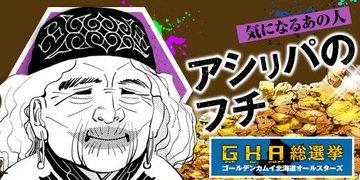
Huci (フチ Ainu word for “Grandmother”)
Asirpa: She calls her ‘Asirpa’ (アシㇼパ) (Chap 11).
Sugimoto Saichi: She calls him ‘Sugimoto Nispa’ (スギモトニㇱパ Ainu word for “Mister Sugimoto”) (Chap 12).
Tanigaki Genjirō: She calls him ‘Tanigaki Nispa’ (タニガキニㇱパ Ainu word for “Mister Tanigaki”) (Chap 44).
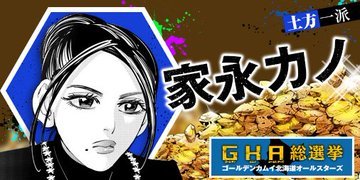
Ienaga Kano (家永 カノ)/Chikanobu (親宣) .
Ienaga Kano: She uses ‘Watashi’ (わたし/私 “I”) to talk about herself (Chap 50) and she introduces herself as the ‘Okami no Ienaga’ (女将の家永 “Ienaga, the proprietress”).
Shiraishi Yoshitake: Talking about him she calls him ‘Shiraishi’ (Chap 51). When he tosses against her the second explosive she calls him ‘Tako bōzu’ (タコ坊主 “Bald head”) (Chap 54).
Sugimoto Saichi: While telling him about Ushiyama she calls him ‘Okyakusama’ (お客様 “Customer”) (Chap 53).
Ushiyama Tatsuma: Meeting him she calls him ‘Okyakusama’ (お客様 “Customer”) (Chap 50) although, when she thinks at him, she calls him ‘Ushiyama’ (Chap 51). As she’s escaping she calls him ‘ Zenshin chinpo yarō’ (全身チンポ野郎 “Walking dick bastard”) (Chap 53). Telling Sugimoto he’s a convict she calls him ‘Fuhai no Ushiyama’ (不敗の牛山 “Ushiyama the Undefeated”) (Chap 53). When she asks him when he was perfect she calls him ‘Anata’ (あなた “You”) (Chap 54).
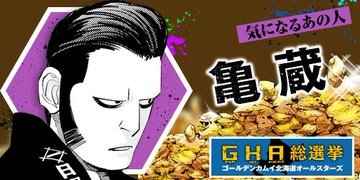
Kamezō (亀蔵).
Hijikata Toshizō: He calls him a ‘Jīsan’ (爺さん “Old man”) (Chap 58).
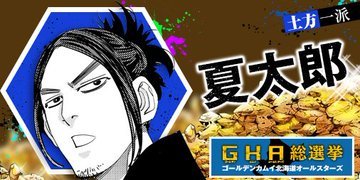
Kantarō (夏太郎).
Ogata Hyakunosuke: He calls him ‘ Yagura no otoko’ (やぐらの男 “The watchtower man”) (Chap 58).
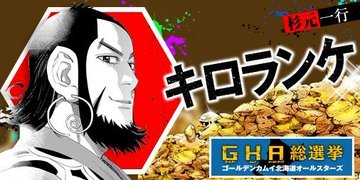
Kiroranke (キロランケ)/ Yulbars (Юлбарс/ユルバルス).
Kiroranke: He uses ‘Ore’ (俺 “I”) to talk about himself (Chap 48) and refers to himself as ‘Ore wa dainana shidan’ (俺は第七師団 “Member of the 7th division”) (Chap 23), claiming he is a ‘E-hei’ (エ兵 “Combat engineer”)
Kiroranke & others: He uses ‘Ore-tachi’ (俺たち “We”) to talk about himself and Wilk (Chap 49).
Asirpa: He calls her ‘Asirpa’ (アシㇼパ) (Chap 47) and ‘Omae’ (お前 “You”) (Chap 48).
Hijikata Toshizō: He calls him a ‘Toshioita wajin’ (年老いた和人 “Old Japanese man”) (Chap 48).
Shiraishi Yoshitake: When hearing it he’ll repeat Shiraishi’s nickname ‘Datsugoku-ō’ (脱獄王 “Escape king”), asking what it means (Chap 49). He then starts to call him ‘Shiraishi’ (シライシ) (Chap 51). Complaining he blew up all his explosive he calls him ‘Shiraishi no yarō’ (シライシの野郎 “Damn Shiraishi”) (Chap 55).
Sugimoto Saichi: When hearing his name he calls him ‘Sugimoto’ and then ‘Fujimi no Sugimoto’ (不死身の杉元 “Sugimoto the Immortal”) (Chap 48). He then defines him ‘Sensō no eiyū’ (戦争の英雄 “War hero”) (Chap 48). When saying no bodies were found he calls him ‘Sugimoto’ (Chap 55).
Tanigaki Genjirō: When he sees him he calls him first ‘Omae’ (おまえ “You”) then ‘Asirpa no Oji’ (アシㇼパの叔父 “Asirpa’s younger uncle”).
Tsurumi Tokushiro: Hearing about him he calls him ‘Tsurumi chūi’ (鶴見中尉 “First Lieutenant Tsurumi”) (Chap 48).
Ushiyama Tatsuma: The first time he sees him he calls him ‘Sinna kisar’ (シンナキザㇻ Ainu word for “Strange ears”) (Chap 52). After he tells Asirpa which sort of man she has to pick he calls him ‘Sensei’ (先生 “Teacher”) (Chap 52).
Wilk: Talking about him he calls him ‘Nopperabō’ (のっぺら坊 “Faceless male”) (Chap 48) and says he’s ‘Asirpa no chichioya’ (アシㇼパの父親 “Asirpa’s father”) (Chap 48). Looking at Shiraishi’s tattoo he claims the only person who could do it is ‘Ano hito’ (あの人 “That person”) (Chap 49).
Others: Talking about how he is okay with Shiraishi and Sugimoto getting their share of gold he calls them ‘Omae-tachi’ (お前たち “You (Plural)”) (Chap 49).

Komiya (小宮) - Rank: ‘Ittōhei’ (一等兵 “Private First Class”)

Kusuda Umakichi (久寿田 馬吉).
Kusuda Umakichi: He uses ‘Ore’ (俺 “I”) to talk about himself (Chap 58).
Chiyoko: He calls her Hidoro’s ‘Miomo no mekake’ (身重の妾 “Pregnant mistress”) (Chap 55) or ‘Hidoro no mekake’ (日泥の妾 “Hidoro’s mistress”) (Chap 55).
Ejiri Matasuke: He calls him ‘Ejiri shochō’ (江尻署長 “Chief Ejiri”) (Chap 58).
Hidoro Tamotsu: He calls him ‘Hidoro’ (Chap 55) and ‘Nishin-ba no Hidoro’ (ニシン場の日泥 “Hidoro of the herring fishery”) (Chap 55).
Ogata Hyakunosuke: He calls him ‘Sensei’ (先生 “Master”) (Chap 56).
Others: He calls Hijikata and Nagakura ‘Danna-gata’ (旦那方 “Sirs”) (Chap 55).
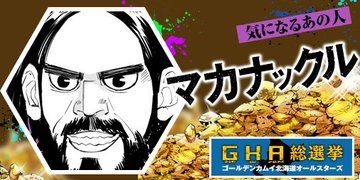
Makanakkuru (マカナックル).
Makanakkuru: He uses ‘Watashi’ (私”I”) to talk about himself (Chap 13).
Asirpa: He calls her ‘Asirpa’ (アシㇼパ) (Chap 13) and says she is ‘Watashi no ane no musume’ (私の姉の娘 “His elder sister’s daughter”) (Chap 13).
Henmi Kazuo: He calls him a ‘Ryōshi’ (漁師 “Fisherman”) (Chap 38).
Soldiers of the 7th: Talking with Tanigaki he calls them ‘Omae-tachi’ (おまえたち “You” (plural)) (Chap 30).
Retar: He calls him ‘Retar’ (Chap 14) and defines him a ‘Horkew Kamuy’ (ホㇿケウカムイ Ainu word for “Wolf god”) (Chap 14).
Shiraishi Yoshitake: He calls him ‘Shiraishi’ when he says he’ll head after him (Chap 39).
Sugimoto Saichi: He calls him ‘Sugimoto-san’ (杉元さん) (Chap 14). Later he switches to just ‘Sugimoto’ when calling him (Chap 38).
Wilk: He calls him ‘Asirpa no tō’ (アシㇼパの父 “Asirpa’s father”) (Chap 13).
Others: Talking to Asirpa’s group he calls them ‘Omae-tachi’ (お前たち “You” (plural)) (Chap 38).
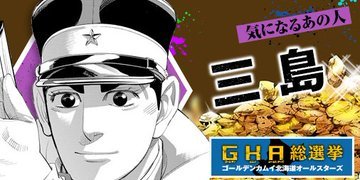
Mishima (三島) - Rank: ‘Ittōhei’ (一等兵 “Private First Class”)
Nikaidō Kōhei: He calls him ‘Nikaidō’ (Chap 46).
Ogata Hyakunosuke: He calls him ‘Ogata Jōtōhei’ (尾形 百之助上等兵 “Superior Private Ogata”) (Chap 46).
Tamai: Talking about him he calls him ‘Tamai Gochō’ (玉井伍長 “Corporal Tamai”) (Chap 46)
Tanigaki Genjirō: He calls him ‘Tanigaki’ (Chap 46) and ‘Omae’ (お前 “You”) (Chap 46).
Tsurumi Tokushirō: He calls him ‘Tsurumi Chūi’ (鶴見中尉 “First Lieutenant Tsurumi”) (Chap 46) and then just ‘Chūi’ (中尉 “First Lieutenant”) (Chap 46).
Others: He calls Tamai’s group ‘Tamai Gochō-tachi’ (玉井伍長たち “Corporal Tamai and co”) (Chap 46)
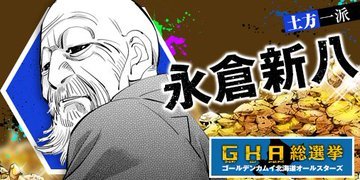
Nagakura Shinpachi (永倉 新八) – Nicknamed ‘Gamushin’ (ガムシン “Reckless Shin(pachi)”).
Nagakura Shinpachi: He uses ‘Watashi’ (私 “I”) to talk about himself (Chap 20). When he’s about to face Kusuda Umakichi’s men he refers to himself as ‘Kono Nagakura Shinpachi’ (この永倉 新八 “This Nagakura Shinpachi”) (Chap 58).
Nagakura Shinpachi & others: He uses ‘Watashi-tachi’ (私たち “We”) to talk about himself and Hijikata’s group (Chap 39).
Chiyoko: He calls her Hidoro’s ‘Mekake (妾 “Mistress”) (Chap 56).
Ejiri Matasuke: He says he is ‘Keisatsu no bun shochō’ (警察の分署長 “Local police chief”) (Chap 56).
Hidoro no Okami: He defines her ‘Hidoro-ka no hontō no oyabun’ (日泥家の本当の親分 “Hidoro family’s real boss”) (chap 56) and, talking with Shinpei he calls her his ‘Okkā’ (おっ母 “Mother”) (Chap 56). Seeing she hid the tattooed skin she calls her ‘Ano Okami’ (あの女将 “That proprietress”) (Chap 59)
Hidoro Shinpei: He calls him ‘Omae’ (お前 “You”) (Chap 56).
Hidoro Tamotsu: He calls him ‘Hidoro’ (Chap 55).
Hijikata Toshizō: He calls him ‘Hijikata-san’ (土方さん) (Chap 20) and ‘Anata’ (あなた “You”) (Chap 21).
Kusuda Umakichi: He calls him ‘Umakichi’ (Chap 56).
Sugimoto Saichi: When talking about him with Shiraishi he’ll define him Shiraishi’s ‘Yōjinbō’ (用心棒 “Bodyguard”) (Chap 39).
Ushiyama Tatsuma: Hearing him screaming he wants a woman he calls him ‘Kedamono’ (ケダモノ “Beast”) (Chap 33). Later, when Ushiyama will call him and Hijikata old guys he’ll call him ‘Kozō’ (小僧 “Youngster/Errand boy”) (Chap 33).
Others: He calls Kusuda Umakichi and his men ‘Kisama-ra’ (貴様ら “You (Plural)”) (Chap 58).
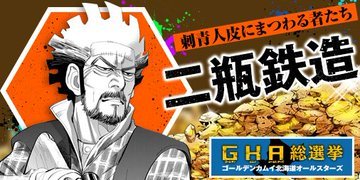
Nihei Tetsuzō (二瓶 鉄造) - Nicknamed ‘Kumauchi’ (熊撃ち “Bear shooter”) and ‘Tōmin-chū no higuma mo unasareru akumu no kumauchi’ (冬眠中の羆も魘される悪夢の熊撃ち “The hunter who gives hibernating bears nightmares”).
Nihei Tetsuzō: He uses ‘Ore’ (オレ and 俺 “I”) to talk about himself (Chap 22 & 26). When he talks about his cuisine he uses ‘Nihei’ (ニヘイ) (Chap 23). When he has to fight Retar he defines himself a ‘Kemono’ (獣 “Beast”) (Chap 29) and ‘Ore ippiki’ (俺一匹 “This one animal”) (Chap 29).
Asirpa: Asking Tanigaki if he’s talking about her he calls her ‘Ainu no Shōjo’ (アイヌの少女 “Ainu girl”) (Chap 25). Saying Tanigaki to take her away he calls her ‘Sono ko’ (その子 “This child”) (Chap 28). While talking with her he calls her ‘Ojō-chan’ (お嬢ちゃん “Miss”) (Chap 28)
Dunn, Eddie: Talking about who caused the wolves extinction he calls him an ‘America-jin’ (アメリカ人 “American”) (Chap 24).
Matagi: He refers to them as ‘Matagi’ (Chap 22). Talking about the Matagi he calls them ‘Monooto tatezu ni kōdō suru seiei butai’ (物音立てずに行動する精鋭部隊 “Elite troops acting without sound”) (Chap 23) and ‘Omae-ra’ (お前ら “You (Plural)”) (Chap 23).
Retar: He first calls him ‘Saishū no ōkami’ (最終の狼 “Last wolf”) (Chap 23), then just ‘Ōkami’ (狼 “Wolf”) (Chap 24). When he has to fight Retar he defines him a ‘Kemono’ (獣 “Beast”) (Chap 29).
Ryū: He first calls him ‘Kono inukkoro’ (この犬っころ “This little dog”) (Chap 22), then just ‘Ryū’ (Chap 22). When explaining Ryū is trained not to feel fear when facing a bear he calls him ‘Ainu Inu’ (アイヌ犬 “Ainu dog”) (Chap 24). When they’re spending the night waiting for Retar to show up he calls him ‘Daken’ (駄犬 “Mongrel”) and ‘Yutanpo’ (湯たんぽ “Hot water bottle”) (Chap 26).
Shiraishi Yoshitake: Seeing him he calls him ‘Shiraishi’ (Chap 27). When he and Sugimoto escape he calls him by his nickname ‘Datsugoku-ō’ (脱獄王 “Escape king”) (Chap 28).
Tanigaki Genjirō: He first calls him just ‘Matagi’ (マタギ “Matagi”) (Chap 22) then ‘Matagi no heitai-san’ (マタギの兵隊さん “Mister Matagi Soldier”) (Chap 22). He then calls him ‘Matagi no Tanigaki’ (マタギの谷垣 “Matagi Tanigaki”) (Chap 22). He then calls him ‘Omae-san’ (お前さん “You”) (Chap 23). As they’re eating though he calls him just ‘Tanigaki’ (Chap 23). Later he claims he’s a ‘Monoshizukana yakko’ (物静かな奴 “Very quiet guy”) (Chap 23). After knowing why Tanigaki was there, Nihei switches to call him ‘Omae’ (お前 “You”) (Chap 23). When asking him if he had forgotten how to hunt after being in the war he calls him ‘Matagi no Tanigaki-chan’ (マタギの谷垣ちゃん “Little Matagi Tanigaki”) (Chap 24). When asking him if he’s a Matagi or a soldier he calls him ‘Matagi no Tanigaki ka Heitai-san no Tanigaki ka’ (マタギの谷垣か兵隊さんの谷垣か “Tanigaki the Matagi or mister Tanigaki the soldier?”) (Chap 26)

Nikaidō Kōhei (二階堂 浩平) - Rank: ‘Ittōhei’ (一等兵 “Private First Class”).
Nikaidō Kōhei: He uses ‘Ore’ (俺 “I”) to talk about himself (Chap 45) and asks Ogata if he’s supposed to become ‘Esa’ (エサ “Bait”) (Chap 45).
Komiya: He calls him ‘Komiya’ (Chap 46).
Huci: He calls her ‘Bāchan’ (バアチャン “Grandmother”) (Chap 42)
Nikaido Yōhei: He calls him ‘Yōhei’ (Chap 17).
Ogata Hyakunosuke: When attacked by the bear he calls him ‘Kuso Ogata’ (クソ尾形 “Damned Ogata”) (Chap 45) then just ‘Ogata’ (Chap 45)
Tamai: Talking about him he calls him ‘Tamai Gochō’ (玉井伍長 “Corporal Tamai”) (Chap 43)
Tanigaki Genjirō: Talking about him he calls him ‘Ano yarō’ (あの野郎 “That bastard”) (Chap 45) and then just ‘Tanigaki’ (Chap 45)
Tsurumi Tokushirō: When talking about him he calls him ‘Tsurumi chūi’ (鶴見中尉 “First Lieutenant Tsurumi”) (Chap 45). Talking with him he calls him ‘Tsurumi chūi-dono’ (鶴見中尉殿 “First Lieutenant Tsurumi, sir”) (Chap 46)
Sugimoto Saichi: He uses ‘Omae’ (お前 “You”) to call him (chap 15) and then after Tsurumi has interrogated him ‘Kushi dango yarō’ (串団子野郎 “Dango boy”) (Chap 17). After losing his ears he calls him ‘Sugimoto Saichi’ (Chap 46).
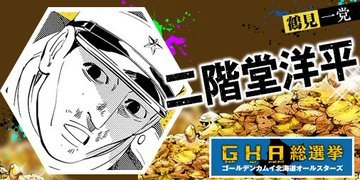
Nikaidō Yōhei (二階堂 洋平) - Rank: ‘Ittōhei’ (一等兵 “Private First Class”).
Nikaidō Yōhei: He uses ‘Ore’ (俺 “I”) to talk about himself (Chap 17).
Nikaidō Kōhei: He calls him ‘Kōhei’ (Chap 17).
Sugimoto Saichi: He calls him ‘Temē’ (てめえ “You”) when he asks him what he’s babbling about (Chap 17).
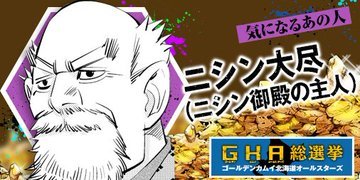
Nishin Daijin (Nishin goten to Shujin) (ニシン大尽 (ニシン御殿の主人) “Herring Great Magnate (Master of the herring palace)”).
Nishin Daijin: He uses ‘Ore’ (俺 “I”) to talk about himself (Chap 40).
Tsurumi Tokushirō: He calls him ‘Tsurumi-san’ (鶴見さん) (Chap 40).

Noma (野間) - Rank: ‘Ittōhei’ (一等兵 “Private First Class”).
Noma: He uses ‘Ore’ (俺 “I”) to talk about himself (Chap 10).
Sugimoto Saichi: Understanding who he is, first he calls him ‘Dai ichi shidan no Sugimoto’ (第一師団の杉元 “Sugimoto of the first division”) then ‘Fujimi no Sugimoto’ (不死身の杉元 “Sugimoto the Immortal”) (Chap 9). Ordering him to get down on his stomach he calls him ‘Sugimoto’ (Chap 10).
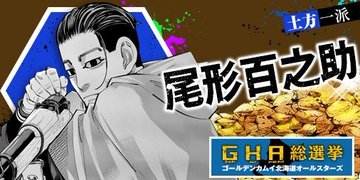
Ogata Hyakunosuke (尾形 百之助) - Rank: ‘Jōtōhei’ (上等兵 “Superior Private”) – Nicknamed ‘Kokō yamaneko’ (孤高山猫 “Solitary Wildcat”).
Ogata Hyakunosuke: He uses ‘Ore’ (俺 “I”) to talk about himself (Chap 43). Asking Hijikata if he can work for him he says he’s ‘Ude no tatsu yōjinbō’ (腕の立つ用心棒 “Skilled bodyguard”) (Chap 59).
Asirpa: Talking about her he calls her ‘Ainu no kodomo’ (アイヌの子供 “Ainu child”) (Chap 43).
Chiyoko: He calls her ‘Mekake no ie’ (妾の家 “Mistress of the house”) (Chap 57).
Ejiri Matasuke: He calls him ‘Shochō’ (署長 “Chief”) (Chap 56) and nicknames him ‘Ketsu ago’ (ケツ顎 “asscrack chin”) (Chap 56). He also calls him ‘Ketsu Shochō’ (ケツ署長 “Ass Chief”) (Chap 57).
Hidoro no Okami: He calls her ‘Hidoro Okami’ (日泥女将 “Hidoro’s proprietress”) (Chap 58).
Hidoro Shinpei: He calls him ‘Temē’ (テメエ “You”) (Chap 59) and says ‘Temē mitaina ikuji no nai yatsu ga ichiban mukatsuku nda’ (テメエみたいな意気地の無い奴が一番むかつくんだ “A guy without character like you is the most annoying”) (Chap 59).
Hijikata Toshizō: Discovering his cartridge he calls him ‘Ano jīsan’ (あの爺さん“That old man”)(Chap 57). Saying he has recognized him he calls him ‘ Hijikata Toshizō-san’ (土方歳三さん “Mister Hijikata Toshizō”)(Chap 59).
Kusuda Umakichi: He calls him ‘Umakichi’ (Chap 56).
Mishima: He calls him ‘Mishima’ (Chap 46).
Nagakura Shinpachi: He calls him ‘Jijī’ (ジジイ “Old man”) (Chap 57).
Noma: Talking about him he calls him ‘Noma’ (Chap 43).
Nikaidō Kōhei: He calls him ‘Nikaidō’ (Chap 43).
Ogata Hyakunosuke no soba (尾形 百之助の祖母 “Ogata Hyakunosuke’s grandmother”): Talking about her with Nikaidō he calls her ‘Bāchan’ (バアチャン “Grandmother”) (Chap 43)
Okada: Talking about him he calls him ‘Okada’ (Chap 43).
Sugimoto Saichi: In the beginning he uses ‘Kisama’ (きさま “You”) to call him, then, understanding who he is, first he calls him ‘Dai ichi shidan no Sugimoto’ (第一師団の杉元 “Sugimoto of the first division”) then ‘Fujimi no Sugimoto’ (不死身の杉元 “Sugimoto the Immortal”) (Chap 5).
Tamai: Talking about him he calls him ‘Tamai Gochō’ (玉井伍長 “Corporal Tamai”) (Chap 43).
Tanigaki Genjirō: When first meeting him he calls him Tanigaki Genjirō Ittōhei’ (谷垣 源次郎一等兵 “Private First Class Tanigaki Genjirō”) (Chap 42).When commenting it was Tanigaki the one the villagers spoke about he first called him ‘Tanigaki’ then ‘Omae’ (おまえ/お前 “You”) (Chap 43). He defines him a ‘Majimena otoko’ (真面目な男 “Earnest guy”) (Chap 43). He defines him as a ‘Matagi’ (マタギ “Matagi”) (Chap 45).
Tsurumi Tokushirō: Talking with Tanigaki he calls him ‘Tsurumi chūi’ (鶴見中尉 “First Lieutenant Tsurumi”) (Chap 43). Escaping from him he calls him ‘Tsurumi chūi-dono’ (鶴見中尉殿 “First Lieutenant Tsurumi, sir”) (Chap 46).
Other: Talking about Tamai’s group he calls them ‘Tamai Gochō-tachi’ (玉井伍長たち “Corporal Tamai and the others”) (Chap 43). He calls Hijikata and Nagakura ‘Anta-ra’ (あんたら “You (Plural)”) (Chap 59).

Okada (岡田) - Rank: ‘Ittōhei’ (一等兵 “Private First Class”).
Sugimoto Saichi: After Noma told him who he is, he calls him ‘Fujimi no Sugimoto’ (不死身の杉元 “Sugimoto the Immortal”) (Chap 9).

Osoma (オソマ).
Osoma: She uses ‘Atashi’ (あたし “I”) to talk about herself (Chap 12).
Asirpa: She calls her ‘Asirpa’ (アシㇼパ) (Chap 44).
Nikaidō Kōhei: She calls him ‘Sinna kisar’ (シンナキザㇻ Ainu word for “Strange ears”) (Chap 43).
Ogata Hyakunosuke: She calls him ‘Sinna kisar’ (シンナキザㇻ Ainu word for “Strange ears”) (Chap 43).
Ryū: She calls him ‘Ryū’ (Chap 44).
Shiraishi Yoshitake: She calls him ‘Sinna kisar’ (シンナキザㇻ Ainu word for “Strange ears”) (Chap 30).
Sugimoto Saichi: She first calls him ‘Sinna kisar’ (シンナキザㇻ Ainu word for “Strange ears”) then ‘Henna mimi’ (変な耳 “Strange ears”) (Chap 12).
Tanigaki Genjirō: She calls him ‘Sinna kisar’ (シンナキザㇻ Ainu word for “Strange ears”) (Chap 43). She calls him ‘Tanigaki Nispa’ (タニガキニㇱパ Ainu word for “Mister Tanigaki”) (Chap 44).

Retar (レタㇻ)
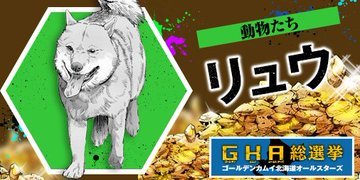
Ryū (リュウ)

Shibukawa Zenjirō (渋川 善次郎).
Shibukawa Zenjirō: He uses ‘Ore’ (俺 “I”) to talk about himself (Chap 21).
Hijikata Toshizō: He calls him ‘Anta’ (あんた “You”) (Chap 21).
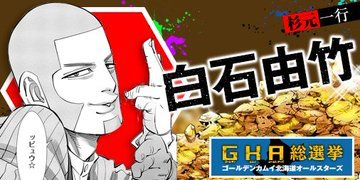
Shiraishi Yoshitake (白石 由竹) - Nicknamed ‘Datsugoku-ō’ (脱獄王 “Escape king”).
Shiraishi Yoshitake: He uses ‘Ore’ (俺 “I”) to talk about himself (Chap 6) although he also refers to himself by his nickname ‘Datsugoku-ō’ (脱獄王 “Escape king”) (Chap 7). Seeing Asirpa asleep he understands she wanted him to stay so he’ll be her ‘Yutanpo’ (湯たんぽ “Hot water bottle”) (Chap 32). He introduces himself to Ienaga as ‘Shiraishi Yoshitake’ (シライシ ヨシタケ) (Chap 51).
Shiraishi Yoshitake & others: He uses ‘Ore-tachi’ (俺たち “We”) to talk about himself Asirpa and Sugimoto (Chap 30).
Asirpa: He calls her ‘Sono Ainu’ (そのアイヌ “This Ainu”) when he asks Sugimoto if she’s his ‘Kaiinu’ (飼いイヌ “Pet dog/Pet Ainu”, through it’s actually a wordplay that takes advantage of how the last part of the word aINU is ‘Inu’, which written with this kanji 犬 means “dog”). Meeting her again he calls her ‘Ainu no Gaki’ (アイヌのガキ “Ainu brat”) (Chap 17) to switch to just ‘Omae’ (おまえ “You”) when he thinks Sugimoto double crossed her (Chap 17). Explaining to Sugimoto why he came to save him he calls her ‘Okkanai Ainu no musumekko’ (おっかないアイヌの娘っ子 “Scary Ainu girl”) (Chap 18). He calls her ‘Asirpa-chan’ (アシリパちゃん) (Chap 20). When saying they shouldn’t use her as hostage he calls her ‘Kodomo’ (子供 “Child”) (Chap 28).
Gifutarō: While escaping from Shiraishi he calls him ‘Dekabutsu’ (デカブツ “Big lump”) and then ‘Omae’ (お前 “You”) (Chap 33).
Gotō: Talking about him he calls him ‘Gotō no Ossan’ (後藤のおっさん “Old man Gotō”) (Chap 31).
Hijikata Toshizō: He defines him as ‘Shūjin-tachi no Oyadama’ (囚人たちの親玉 “leader of the prisoners”) (Chap 7) and explains they thought he was just a ‘Jī-san’ (ジイさん “Old man”), a ‘Seiji-han’ (政治犯 “Political prisoner”), ‘Mohan-shū’ (模範囚 “Model prisoner”) but then discovered he was a ‘Kyū bakufu-gun no samurai’ (旧幕府軍の侍 “Samurai of the former shogunate army”), the ‘Shinsenkumi Oni no Fukuchō Hijikata Toshizō’ (新撰組鬼の副長土方 歳三 “Demonic vice-commander of the Shinsengumi Hijikata Toshizō”) (Chap 7). Meeting him he calls him ‘Hijikata Toshizō’ (Chap 37). Meeting him in a worker lodge he calls him ‘Jijī’’ (このジジイ “This old man”) (Chap 43)
Henmi Kazuo: Talking about him with Sugimoto and Asirpa he calls him ‘Henmi’ (Chap 37). Recalling their past together he’ll call him ‘Henmi Kazuo’ (Chap 38). As the orca starts tossing him around he resumes calling him just ‘Henmi’ (Chap 41).
Huci: After hearing the legend of the gold from her he calls her ‘Bā-chan’ (ばちゃん “Grandmother”) (Chap 30).
Ienaga Kano: Asking her name he calls her ‘Ienaga-san’ (家永さん “Miss Ienaga”) (Chap 51) and claiming he’s falling for her he calls her ‘Ienaga Kano-san’ (家永カノさん “Miss Ienaga Kano”) (Chap 51). When trying to enter in the room he believes she was in, he calls Ienaga ‘Kano-san’ (カノさん “Miss Kano”) (Chap 51). When she injects something in him he calls her just ‘Ienaga’ (Chap 52). When thinking at her as Chicanobu he calls him a ‘Jijī’ (ジジイ “Old man”) (Chap 53). Escaping from her he calls her ‘Hentai isha’ (変態医者 “Perverted doctor”) (Chap 53).
Kiroranke: Asking Sugimoto if it’ll be safe to take him with them he calls him ‘Ano otoko’ (あの男 “That man”) (Chap 49). Telling him they’ve to leave the hotel he calls him ‘Kiroranke’ (Chap 53).
Nihei Tetsuzō: Talking about him he says he is a ‘Ude no tatsu ryōshi’ (腕の立つ猟師 “Ridiculously skilled hunter”) and is nicknamed by pelt trader as ‘Tōmin-chū no higuma mo unasareru akumu no kumauchi Nihei Tetsuzō’ (冬眠中の羆も魘される悪夢の熊撃ち二瓶鉄造 “The hunter who gives hibernating bears nightmares, Nihei Tetsuzō”) (Chap 25). Saying it’s him he calls him ‘Nihei Tetsuzō’ (Chap 27). Comparing him to Ushiyama he calls him ‘Nihei’ (Chap 31).
Retar: When he’s awakened by him he calls him ‘Yōkai’ (妖怪 “Ghost/Monster”) (Chap 17). He then calls him ‘Retar’ (Chap 34).
Ryū: When the two of them fight he calls him ‘Kono wan-bun’ (このワン分 “This small dog”). He calls him ‘Ryū’ (Chap 36). When Ryū escapes leaving him alone with Ushiyama he calls him ‘Kuso Inu’ (クソ犬 “Damned dog”) (Chap 37).
Sugimoto Saichi: At first he calls him ‘Omae-chan’ (お前ちゃん “You”) (chap 6) to switch to just ‘Omae’ (お前 “You”) when they risk dying of hypothermia (Chap 7). After they talk, when he says bye to him he calls him ‘Fujimi no Sugimoto’ (不死身の杉元 “Sugimoto the Immortal”) (Chap 7). Discovering Sugimoto is still alive despite having been captured by the 7th he calls him ‘Shibutoi yarō’ (しぶとい野朗 “Stubborn guy”) and ‘Sugimoto no yarō’ (杉元の野朗 “That Sugimoto guy”) (Chap 18). Afterward he’ll usually go for ‘Sugimoto’ (Chap 18) though he’ll slip back to ‘Fujimi no Sugimoto’ (不死身の杉元 “Sugimoto the Immortal”) when talking about him to Hijikata (Chap 37). When Hijitaka will question him further he’ll say Sugimoto is more his ‘Kobun’ (子分 “Henchman”) than an ‘Aibō’ (相棒 “Partner”) (Chap 39). After Sugimoto killed Henmi he comments ‘Koitsu ga ichiban okkane e’ (こいつが一番おっかねえ “This guy is the most dangerous of all”) (Chap 42)
Sugimoto-tachi o Bikō Shite Ita Shūjin: Seeing his skin he calls him a ‘Zako’ (雑魚 “Small fish”) (Chap 31).
Tanigaki Genjirō: He calls him ‘Tanigaki’ (Chap 36).
Tsurumi Tokushirō: Seeing him wear the tattooed skin he calls him ‘Hentai Chūi’ (変態中尉 “Perverted First Lieutenant”) (Chap 19). Talking about him with Tanigaki he also calls him ‘Tsurumitte yatsu’. (鶴見って奴 “That Tsurumi guy”) (Chap 31). Suggesting to report him he calls him ‘Tsurumi Chūi’ (鶴見中尉 “First Lieutenant Tsurumi”) (Chap 50).
Tsuyama: Talking about him he calls him ‘33-Ri koroshita Tsuyama’ (33人殺した津山 “Tsuyama who killed 33 people”) (Chap 31) then just ‘Tsuyama’ (Chap 31).
Ushiyama Tatsuma: Talking about him he calls him ‘Fuhai no Ushiyama’ (不敗の牛山 “Ushiyama the Undefeated”) (Chap 31). Escaping from him he calls him simply ‘Ushiyama’ (Chap 33). As he wonders how he can stops him he calls him ‘Ano abare ushi’ (あの暴れ牛 “That raging bull”) (Chap 33). Asking to the whores if they’ve seen him he called him ‘Irezumi no otoko’ (入れ墨の男 “Tattoed man”) (Chap 34). Asking him what he’s doing at the Sapporo hotel he calls him ‘Anta’ (アンタ “You”) (Chap 54). Hearing Asirpa calling him as such he also echoes her words and calls him ‘Chinpo Sensei’ (チンポ先生 “Professor penis”) (Chap 54).
Wilk: He calls him ‘Nopperabō’ (のっぺら坊 “Faceless male”) as he didn’t have a face (Chap 7).
Others: Talking about Asirpa and Sugimoto he calls them ‘Omae-ra’ (お前ら “You (Plural)”) (Chap 18). Later when he’ll see a tense atmosphere between Sugimoto and Asirpa he’ll always call them ‘Omae-ra’ (オマエら “You (Plural)”) but it’ll be written in a different way (Chap 20) and he’ll claim he won’t intrude in their ‘Fūfugenka’ (夫婦喧嘩 “Matrimonial quarrel”), basically comparing them to a ‘Fūfu’ (夫婦 “Married couple”) (Chap 20). Talking about Sugimoto and Kiroranke he calls them ‘Sensō kaeri’ (戦争帰り “War returners/veterans”) (Chap 49)
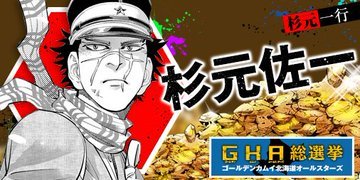
Sugimoto Saichi (杉元 佐一) - Nicknamed ‘Fujimi no Sugimoto’ (不死身の杉元 “Sugimoto the Immortal”).
Sugimoto Saichi: He uses ‘Ore’ (俺 “I”) to talk about himself (Chap 1). Sometimes, when in danger, he also refers to himself by his nickname ‘Fujimi no Sugimoto’ (不死身の杉元 “Sugimoto the Immortal”) (Chap 2). When talking with Makanakkuru he defines himself as ‘Wajin’ (和人 “Japanese”) (Chap 13). Talking with Henmi he comments if he has to he won’t hesitate to become an ‘Oni’ (鬼 “Demon”) (Chap 39)
Sugimoto & others: Talking with Asirpa he refers to himself and Shiraishi as ‘Ore-tachi’ (俺たち “We”) (Chap 27). Talking about himself and Kiroranke he says they’re ‘Nichirosensō kaeri’ (日露戦争帰り “Russo-Japanese war returners/veterans”) (Chap 49).
Asirpa: When he first sees her he just refers to her as an ‘Ainu’ (アイヌ). Then, to talk with her, in the beginning he uses only ‘Anta’ (あんた “You”) to call her (chap 1) but later he will also start to use ‘Asirpa-san’ (アシリパさん) (Chap 2). When referring to her in front of Tamai’s group he calls her ‘Ainu no gaki’ (アイヌのガキ “Ainu brat”) (Chap 9). When she calls him stupid he calls her ‘hidoi’ (ヒドーイ “Mean”) (Chap 13). Saying Tanigaki can’t use her as a human shield he calls her ‘Sono ko’ (その子 “This child”) (Chap 28) and says he can’t use her as a ‘Tate’ (盾 “Shield”) (Chap 28). When saying Asirpa wants to save Tanigaki he calls her ‘Ore no aibō’ (俺の相棒 “His partner”) (Chap 30). When Henmi asks him why he’s with her he calls her ‘kono ko’ (この子 “This child”) (Chap 39).
Gifutarō: When meeting him a second time Sugimoto calls him ‘Dekabutsu’ (デカブツ “Huge guy”) (Chap 15).
Gotō: In the beginning he uses ‘Anta’ (あんた “You”) to call him (chap 1). When he discovers he was one of the prisoners he calls him ‘Kono Oyaji’ (このオヤジ “Old bastard”) (Chap 1). In front of Asirpa he’ll call him ‘Kono Hito’ (この人 “This man”) (Chap 2). Talking about the skins they have he refers to him as ‘Sake de jinsei kurutta ossan’ (酒で人生狂ったオッサン “Old man who ruined his life with booze”) (Chap 47)
Henmi Kazuo: Talking about him Sugimoto calls him ‘Henmi’ (Chap 38). Later he thinks at him as a ‘Gokuakunin’ (極悪人 “Scoundrel”) (Chap 38). When promising him he’ll think at him he calls him ‘Omae’ (お前 “You”) (Chap 41). When the orca takes him he says they’ve to get ‘Henmi Kazuo’ back (Chap 41). As he comments he saw him gleaming in the end he calls him ‘Omae’ (おまえ “You”) (Chap 41). Talking about the skins they have he refers to him as ‘Nishin-ba ni ita renzoku satsujinki no ossan’ (ニシン場にいた連続殺人鬼のオッサン “The old serial killer at the herring fishery”) (Chap 47)
Hijikata Toshizō: Asking info about him he calls him ‘Oyadama’ (親玉 “leader”) (Chap 7). Seeing him in the worker lodge he calls him ‘Hen'na jī-san’ (変なジイさん “Weird old man”) (Chap 44). Talking about him he calls him first ‘Hijikata’ then ‘Hijikata Toshizō’ (Chap 47)
Huci: Meeting her he calls her ‘Obā-san’ (お婆さん “Grandmother”) (Chap11) but then he later switches to ‘Obā-chan’ (お婆ちゃん “Grandmother”) (Chap 13).
Ienaga Kano: When she tries to lick Asirpa’s eyeballs he calls her ‘Temee’ (てめえ “You”) (Chap 53) and then ‘Yōkai medama name’ (妖怪目玉舐め“Eyeball licking monster”) (Chap 53). When he’s told she is Chicanobu he calls him a ‘Jijī’ (ジジイ “Old man”) (Chap 53). When she escapes he calls her ‘Okami’ (女将 “Proprietress”) (Chap 53). Saying she was on the second floor with Ushiyama he calls her ‘Ienaga’ (Chap 55).
Kiroranke: Meeting him he asks him if he is ‘Tsurumi chūi no teshita’ (鶴見中尉の手下 “First Lieutenant Tsurumi’s minion”) (Chap 48). Later he calls him ‘Anta’ (アンた “You”) (Chap 48). Later on he’ll calls him ‘Anta’ (あんた “You”) but this time is written in Hiragana (Chap 49). When telling Shiraishi he’s hiding something, he calls him ‘Kiroranke’ (Chap 49).
Nihei Tetsuzō: When explaining Shiraishi has to tag along so they can recognize him he calls him ‘Nihei Tetsuzō’ (Chap 26). Talking about the skins they have he refers to him as ‘ Saigo no ōkami o otte ita ryōshi no ossan’ (最後の狼を追っていた猟師のオッサン “The old hunter who was chasing the last wolf”) (Chap 47)
Nikaidō Yōhei: When he says he’ll mark him he calls him ‘Omae’ ( おまえ “You”) (Chap 17). Attacking him before killing him he calls him ‘Hanuke yarō’ (歯抜け野朗 “Missing tooth guy”) (Chap 18).
Ogata Hyakunosuke: When Ogata removes his coat Sugimoto calls him simply a ‘Heishi’ (兵士 “Soldier”).
Osoma: When he asks her for her name he calls her ‘Ojō-chan’ (お嬢ちゃん “Miss”) (Chap 12). Later, when talking with her father, he calls her ‘Osoma-chan’ (オソマちゃん).
Retar: First seeing him Sugimoto calls him a ‘Yaken’ (野犬 “Wild dog”) as that’s what he thought Retar was (Chap 2) and also referred to him as a ‘Dekai Shiroi Inu’ (デカイ白い犬 “Huge white dog”) (Chap 2). When seeing him with Asirpa after his confrontation with Tamai group he calls him ‘Shiroi Ookami’ (白いオオカミ “White Wolf”) and then just ‘Ookami’ (オオカミ “Wolf”) (Chap 11). When seeing Retar running after the deer he missed he calls him just ‘Retar’ (Chap 24) .
Ryū: He calls him ‘Ryū’ and ‘Orikō-san’ (おりこうさん “Mister well-behaved one”) (Chap 36).
Shiraishi Yoshitake: When they capture him with the squirrel trap he labels him ‘Nibikime’ (二匹目 “the second small animal”) they captured (Chap 6). He then calls him ‘Omae’ (お前 “You”) (Chap 6). When Shiraishi is trying to escape he calls him ‘Kono yarō’ (この野郎 “You bastard”) (Chap 6). When Shiraishi tries rub a huge piece of wood to make a fire he calls him ‘Aho’ (アホ “Idiot”) (Chap 7). Then, when searching for the cartridges in the river calls him ‘Temē’ (テメー “You”) (Chap 7). After they talk though, he starts to call him ‘Shiraishi’ (Chap 7). When he sees him slipping in his cell through the bars he calls him ‘Yōkai’ (妖怪 “Ghost/Monster”) (Chap 18). When scolding him for not bringing up Nihei was searching for a white wolf sooner Sugimoto calls him ‘Temē’ (てめー “You”) (Chap 26). When Shiraishi can’t find the way Tanigaki went he calls him ‘Aho’ (アホ “Idiot”) (Chap 28). Talking about the skins they have he refers to him as ‘ Datsugoku shite wa tsukamaru dojina ossan’ (脱獄しては捕まるドジなオッサン “The clumsy old guy who escapes from prison only to get caught again”) (Chap 47). When he calls in the water he calls him ‘Kono baka’ (このバカ “this idiot”) (Chap 47) and ‘Yakudatazu’ (役立たず“Useless”) (Chap 47) and once he was fished back he called him ‘Ningyo’ (人魚 “Mermaid”) (Chap 47). Saying he might have gone to Susukino he calls him ‘ Ano ero bōzu’ (あのエロ坊主 “That pervert bald head”) (Chap 55).
Soldiers of the 7th: While talking with the Nikaidō twins he calls the other soldiers their ‘Onakama’ (仲間 “Buddies”) (Chap 18), while when talking with them he calls them ‘Omae-ra’ (お前ら and おまえら “You (plural)”) (Chap 18).
Sugimoto-tachi o Bikō Shite Ita Shūjin: When they capture him with the squirrel trap he claims he is the ‘Itsupikime’ (一匹目 “the first small animal”) they captured (Chap 3). Talking about the skins they have he refers to him as ‘Dainanashidan ni o uchinuka reta ossan’ (第七師団にを撃ち抜かれたオッサン “The old man shot by the seventh division”) (Chap 47)
Tanigaki Genjirō: When he sees him lying on the ground Sugimoto calls him simply a ‘Heishi’ (兵士 “Soldier”) (Chap 11). Seeing him holding Asirpa as obstage he calls him ‘Kisama’ (きさま “You”) (Chap 28). When asking her if she’s really bringing him to her village he keeps on calling him ‘Koitsu’ (こいつ “This guy”) (Chap 29) When Tanigaki tells them to let him die he calls him ‘Tanigaki’ (Chap 30).
Toraji: He calls him ‘Toraji’ (Chap 1). Talking about Toraji with Asirpa he calls him first ‘Osananajimi’ (幼なじみ “childhood friend”) then switches to ‘Senyū’ (戦友 “comrade in arms/war buddy”) (Chap 1). Asking him if he really left his wife alone to see him he calls him ‘Omae’ (お前 “You”) (Chap 35).
Tsurumi Tokushirō: Talking with the Nikaidō brothers he calls him ‘Omae-ra no Taishō’ (お前らの大将 “Your commander”) (Chap 16). When thinking he should have pretended to join him he calls him ‘Ano Tsurumi toka iu chūi’ (あの鶴見とかいう中尉 “That lieutenant Tsurumi or whatever”) (Chap 17). When talking with Tanigaki he calls him ‘Tsurumi chūi’ (鶴見中尉 “First Lieutenant Tsurumi”) (Chap 30).
Umeko: Talking about her with Toraji he uses ‘Umeko’. Calling her he uses ‘Ume-chan’ (梅ちゃん) (Chap 1). When talking with Ogata about why he’s searching the gold he calls her ‘Horeta Onna’ (惚れた女 “the woman he fell in love with”) (Chap 5). He however calls her ‘Omae’ (お前 “You”) when he tells her to marry Toraji (chap 6). Talking with Toraji about her he calls her ‘Hanayome’ (花嫁 “Bride”) (Chap 35).
Ushiyama Tatsuma: The first time he sees him he calls him ‘Anta’ (アンた “You”) (Chap 52) and when he tries to cause him to lose balance he mentally calls him ‘kono ossan’ (このオッサン “This old man”) (Chap 52). After he tells Asirpa which sort of man she has to pick he calls him ‘Sensei’ (先生 “Teacher”) (Chap 52). While they fight he calls him ‘Kono yarō’ (コノ野郎 “This bastard”) (Chap 54). Wondering if he died in the explosion he calls him ‘Ushiyama’ (Chap 54).
Wilk: He calls him ‘Nopperabō’ (のっぺら坊 “Faceless male”) as this was how Sugimoto-tachi o Bikō Shite Ita Shūjin told him he was called (Chap 6). Learning he might be Asirpa’s father he calls him ‘Asirpa-san no chichioya’ (アシリパさんの父親 “Asirpa’s father”) (Chap 48)
Others: He calls Tamai, Noma and Okada ‘Anta-ra’ (あんたら “You (plural)”) (Chap 9) and then just ‘Henshi-tachi’ (軍士たち”Soldiers”) (Chap 17). He calls Nikaidō Kōhei and Yōhei ‘Omae-ra’ (お前ら and おまえら “You (plural)”) (Chap 16) and, referring to them after their fight, he calls them ‘Ano futago’ (あの双子 “Those twins”) (Chap 18). He calls Tsurumi and his men ‘Anta-ra’ (あんたら “You (plural)”) (Chap 16).

Sugimoto-tachi o Bikō Shite Ita Shūjin (杉元達を尾行していた囚人 “Prisoner who was tailing Sugimoto’s group”) better known by the fandom as Prisoner number 1 (囚人番号一 Shūjin Bangō Ichi).
Sugimoto-tachi o Bikō Shite Ita Shūjin: He uses ‘Ore’ (俺 “I”) to talk about himself (Chap 4). When he compares himself to the other prisoners he defines himself as a ‘Koakutō’ (小悪党 “Small villain”) (Chap 4).
Hijikata Toshizō: He calls him a ‘Kaibutsu’ (怪物 “Monster”) (Chap 4).
Sugimoto Saichi: He calls him ‘Nī-chan’ (にーちゃん “Older brother/young man”) (Chap 4).
Wilk: He claims everyone called him ‘Nopperabō’ (のっぺら坊 “Faceless male”) as he didn’t have a face (Chap 4).

Tamai (玉井) - Rank: ‘Gochō’ (伍長 “Corporal”).
Asirpa: Talking about her he calls her ‘Kodomo’ (子供 “Child”) (Chap 9).
Ogata Hyakunosuke: Talking about him he calls him ‘Ogata Jōtōhei’ (尾形上等兵 “Superior Private Ogata”) (Chap 8).
Sugimoto Saichi: He uses ‘Kisama’ (きさま “You”) to call him and then ‘Sugimoto’ (Chap 9). When warning his men to keep distance he calls him ‘Fujimi no Sugimoto’ (不死身の杉元 “Sugimoto the Immortal”) (Chap 10).
Tanigaki Genjirō: Talking about him he calls him ‘Tanigaki’ (Chap 9). Talking with him he uses ‘Omae’ (お前 “You”) (Chap 44)
Tsurumi Tokushirō: Talking about him he calls him ‘Tsurumi Chūi’ (鶴見中尉 “First Lieutenant Tsurumi”) (Chap 44).
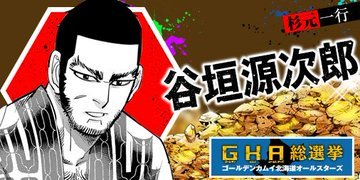
Tanigaki Genjirō (谷垣 源次郎) - Rank: ‘Ittōhei’ (一等兵 “Private First Class”).
Tanigaki Genjirō: He uses ‘Ore’ (俺 “I”) to talk about himself (Chap 9). He also defines himself as a ‘Tōhoku Matagi’ (東北マタギ “Matagi of Tohoku”) (Chap 9). When he tells Asirpa to leave him die he defines himself a ‘Ryōshi’ (猟師 “Hunter”) (Chap 30).
Tanigaki Genjirō & others: Talking about himself and Nihei he uses ‘Ore-tachi’ (俺たち “We”) (Chap 25). Talking about himself and the Matagi he uses ‘Ore-tachi’ (俺たち “We”) (Chap 25). Talking about himself and the soldiers of the 7th he uses ‘Ore-tachi’ (おれたち “We”) (Chap 30).
Asirpa: Talking about her he calls her ‘Kodomo’ (子供 “Child”) (Chap 9) and, seeing she tried concealing her steps he called her ‘Kashikoi Ko’ (賢い子 “Clever child”) (Chap 9). While talking with her he calls her ‘Ojō-chan’ (お嬢ちゃん “Miss”) (Chap 9). Talking about her bond with Retar he calls her ‘Shōjo’ (少女 “Girl”) (Chap 25). Holding her as hostage he calls her ‘Kono musume’ (この娘 “This girl”) (Chap 28).
Hanazawa Kōjirō: Talking about him he calls him ‘Hanazawa Kōjirō Chūjō’ (花沢幸次郎中将 “Lieutenant General Hanazawa”) and says he was the ‘Kono sakusen no sanbō-chō’ (この作戦の参謀長 “Chief of staff for that operation”) and the ‘Moto dainanashidan-chō’ (元第七師団長 “7th division former chief”) (Chap 31).
Huci: After hearing the legend of the gold from her he calls her ‘Bā-san’ (ばさん “Grandmother”) (Chap 30). When Shiraishi visits him he calls her ‘Obā-chan’ (おばあちゃん “Grandmother”) (Chap 36).
Mishima: He calls him ‘Mishima’ (Chap 46) and ‘Omae’ (お前 “You”) (Chap 46).
Nihei Tetsuzō: He refers to him as a ‘Yūmeina kumauchi’ (有名な熊撃ち “Famous bear shooter”) (Chap 22) whose name was ‘Nihei Tetsuzō’ (Chap 22) and also uses ‘Anta’ (あんた “You”) to call him. (Chap 22). Talking about his rifle he calls him ‘Nihei Tetsuzō’ (Chap 44) and then just ‘Nihei’ (Chap 44).
Nikaidō Kōhei: He calls him ‘Nikaidō’ (Chap 43)
Ogata Hyakunosuke: Asking him to spare Huci and Osoma he calls him ‘Ogata Jōtōhei-dono’ (尾形 百之助上等兵殿 “Superior Private Ogata, sir”) (Chap 43). Tanigaki defines him ‘Shageki no tatsujin’ (射撃の達人 “Master Marksman”) (Chap 43). Later he refers to Ogata as just ‘Ogata Jōtōhei’ (尾形 百之助上等兵 “Superior Private Ogata”) (Chap 44).
Osoma: He calls her ‘Osoma’ (Chap 43)
Retar: He calls him a ‘Ezo Ōkami’ (エゾオオカミ “Hokkaido Wolf”) which is what Retar is (Chap 11) and then just ‘Ōkami’ (オオカミ “Wolf”) (Chap 11). He also calls him a ‘Shiroi ōkami’ (白いオオカミ “White Wolf”) (Chap 22). Talking about his bond with Asirpa he calls him ‘Ōkami’ (狼 “Wolf”) (Chap 25). Later, when talking about Retar’s behaviour he suggests he could be an ‘Okuri Ōkami’ (送り狼 “Following wolf”) (Chap 26)
Ryū: He calls him ‘Ryū’ (Chap 36) and defines him a ‘Sudeni shitsuke mo kunren mo sa reta atamanoī ryōken’ (すでにしつけも訓練もされた頭のいい猟犬 “An already well trained smart hound”) (Chap 36). Explaining Shiraishi how he should establish dominance over him he refers to him simply as the ‘Inu’ (犬 “Dog”) (Chap 36).
Tamai: Thinking about him he calls him ‘Tamai Gochō’ (玉井伍長 “Corporal Tamai”) (Chap 43)
Tsurumi Tokushirō: Talking about him he calls him ‘Ore-tachi o hikiite iru chūi’ (俺たちを率いている中尉 “The lieutenant who is leading us”) and ‘Jōhō shōkō’ (情報将校 “Information officer”) (Chap 30), then he refers to him as ‘Tsurumi Chūi’ (鶴見中尉 “First Lieutenant Tsurumi”) (Chap 30).
Tsuyama: Talking about him he calls him ‘Tsuyama’ (Chap 31).
Yodogawa Terunaka: Talking about him he calls him ‘Rentai-chō no Yodogawa chūsa’ (聯隊長の淀川中佐 “Regemental Commander Lieutenant Colonel Yodogawa”) (Chap 50).
Others: Telling Shiraishi Yoshitake & Sugimoto Saichi to drop their weapons he calls them ‘Omae-ra’ (お前ら “You (Plural)”) (Chap 28). Talking about Sugimoto Saichi and his group he calls them ‘Sugimoto-tachi’ (杉元たち“Sugimoto and the others”) (Chap 42). Talking about Ogata and those who betrayed the 7th he uses ‘Yatsu-ra’ (奴ら “Those guys”) (Chap 44) and then ‘Teki’ (敵 “Enemy”).

Thomas (トーマス).
Tsurumi Tokushirō: Talking with him he calls him ‘Tsurumi-san’ (鶴見サン) (Chap 31).
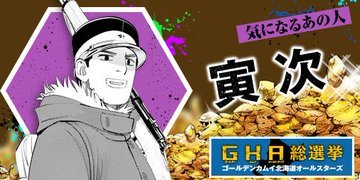
Toraji (寅次).
Toraji: He uses ‘Ore’ (俺 “I”) to talk about himself.
Sugimoto Saichi: He calls him ‘Saichi’ (Chap 1) or ‘Omae’ (お前 “You”). Talking about their relation he calls him ‘Osananajimi’ (幼なじみ “childhood friend”) (Chap 1). Talking about Umeko he says he was the one ‘Umeko no naka ni’ (梅子の中に “Inside Umeko”) (Chap 35).
Toraji’s mother: Talking about her he calls her ‘Kā-chan’ (母ちゃん “Mother”) (Chap 35).
Umeko: Talking about her with Sugimoto he calls her ‘Umeko’ (Chap 1). He also refers to her as his ‘Nyōbō’ (女房 “Wife”) (Chap 1). Talking with her he calls her ‘Umeko’ and ‘Omae’ (おまえ “You”) (Chap 35).
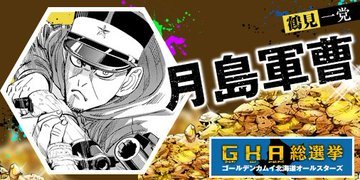
Tsukishima Hajime (月島 基) - Rank: ‘Gunsō’ (軍曹 “Sergeant”).
Mishima: He calls him ‘Mishima’ (Chap 46).
Nikaidō Kōhei: He calls him ‘Nikaidō’ (Chap 46).
Ogata Hyakunosuke: He calls him ‘Ogata’ (Chap 46).
Thomas: Talking with him he calls him ‘Thomas-san’ (トーマスさん) (Chap 31).
Tsurumi Tokushirō: Reporting the situation he calls him ‘Tsurumi Chūi’ (鶴見中尉 “First Lieutenant Tsurumi”) although short after he uses ‘Tsurumi Chūi-dono’ (鶴見中尉殿 “First Lieutenant Tsurumi, sir”) (Chap 34).

Tsurumi Tokushirō (鶴見 篤四郎) - Rank: ‘Chūi’ (中尉 “First Lieutenant”).
Tsurumi Tokushirō: He uses ‘Watashi’ (私 “I”) to talk about himself (Chap 16) however when he says he’ll bite Sugimoto’s candle he uses ‘Ore’ (俺 “I”) to talk about himself (Chap 16). Talking with Sugimoto he’ll also defines himself ‘Omae no Shinigami’ (お前の死神 “Your God of Death/Your reaper”) (Chap 16).
Hanazawa Kōjirō: He calls him ‘ Dai-nana Shidan no Shidan-chō’ (第七師団の師団長 “Division chief of the 7th division”) and ‘Hanazawa chūjō’ (花沢中将 “Lieutenant General Hanazawa”).
Hijikata Toshizō: Seeing him outside the bank he calls him ‘Hijikata Toshizō’ (Chap 34), then he defines him ‘Bakumatsu no bōrei’ (幕末の亡霊 “The departed spirit of the Bakumatsu”) (Chap 34) then corrects himself and says he is a ‘Kono yo ni urami o nokoshita akuryō-me’ (この世に怨みを残した悪霊め “Evil spirit stuck in this world due to a grudge”).
Nikaidō Kōhei: He calls him ‘ Nikaidō’ (Chap 46), then ‘Omae’ (お前 “You”) (chap 46), Uragirimono (裏切り者 “Traitor”) and then ‘Kisama’ (貴様 “You”) (Chap 46).
Nikaidō Yōhei: Studying his corpse he calls him ‘Kisama’ (貴様 “You”) (Chap 19).
Ogata Hyakunosuke: Talking about him, first he refers to him as his ‘Buka’ (部下 “Subordinate”), then he calls him ‘Ogata Jōtōhei’ (尾形上等兵 “Superior Private Ogata”) (Chap 16). Pondering about him he calls him ‘Ogata Hyakunosuke’ (Chap 58) and talking about his family just ‘Hyakunosuke’ (Chap 58)
Ogata Hyakunosuke no haha (尾形 百之助の母 “Ogata Hyakunosuke’s mother”): Talking about her with Nikaidō he says she was Hanazawa’s ‘Mekake’ (妾 “Mistress”) (Chap 58).
Soldiers of the 7th: Talking to them he calls them ‘Omae-tachi’ (おまえたち “You” (plural)) (Chap 31).
Sugimoto Saichi: He uses ‘Omae’ (お前 “You”) to call him (chap 16), then he’ll use ‘Fujimi no Sugimoto’ (不死身の杉元 “Sugimoto the Immortal”) when he’ll try to confirm his identity (Chap 16). When he orders to keep the twins away from him he calls him simply ‘Sugimoto’ (Chap 18).
Tanigaki Genjirō: he calls him both ‘Tanigaki’ and ‘Matagi’ (マタギ “Matagi”) (Chap 13).
Wada: he calls him ‘Wada Taii-dono’ (和田大尉殿 “Captain Wada, sir”) (Chap 13).
Wilk: Talking about him he calls him ‘Nopperabō’ (のっぺら坊 “Faceless male”) (Chap 30).
Others: When saying to keep Nikaidō Kōhei and Yōhei far from Sugimoto he calls them ‘Ano kyōdai’ (あの兄弟 “Those brothers”) (Chap 18). Talking about Asirpa, Shiraishi Yoshitake and Sugimoto Saichi he calls them ‘Sugimoto Ichimi’ (杉元一味 “Sugimoto group”) (Chap 19).
Tsuyama (津山).

Umeko (梅子).
Umeko: When talking about herself with her child she calls herself ‘Okā-chan’ (お母ちゃん “Mother”) (Chap 15), while talking with Sugimoto she uses ‘Watashi’ (わたし) (Chap 15). Talking about how she’ll escape from Sugimoto she uses ‘Watashi’ (私 “I”) (Chap 35).
Toraji: Talking with him about Sugimoto he calls him ‘Toraji-san’ (寅次さん) (Chap 35) but then switches to ‘Tora-chan’ (トラちゃん) (Chap 35).
Sugimoto Saichi: Calling him she uses ‘Saichi-chan’ (佐一ちゃん) (Chap 1). When she can’t recognize him she uses ‘Anata’ (あなた “You”) (Chap 15). Talking with Toraji about him he calls him ‘Saichi-san’ (佐一さん) (Chap 35).
Umeko’s mother: She calls her ‘Okā-san’ (お母さん “Mother”) (Chap 35).

Ushiyama Tatsuma (牛山 辰馬) - Nicknamed ‘Fuhai no Ushiyama’ (不敗の牛山 “Ushiyama the Undefeated”).
Ushiyama Tatsuma: He uses ‘Ore’ (オレ “I”) to refer to himself (Chap 37).
Asirpa: He calls her ‘Ojōchan’ (お嬢ちゃん “Lady”) (Chap 37).
Henmi Kazuo: Talking about him with Nagakura he calls him ‘Henmi Kazuo’ and ‘Yatsu’ (ヤツ “That guy”) (Chap 37).
Hijikata Toshizō: When he sees him he calls him ‘Hijikata no Jijī’ (土方のジジイ”Old man Hijikata”) but then switches to ‘Jī-san’ (爺さん “Grandfather/old man”) (Chap 12). He later settles on calling him ‘Jijī’ (ジジイ “Old man”) (Chap 21). When he sees him killing though he acknowledges he’s the true face of the Shinsegumi ‘Oni no Fukuchō’ (鬼の副長 “Demonic vice-commander”) (Chap 21) He calls him ‘Anta’ (あんた “You”) when he asks him if he plans to make a new Shinsengumi (Chap 21). Talking about Murahashi and Hijikata he calls him first ‘Hijikata Toshizō’ (Chap 52) then ‘Hijikata no yarō’ (土方の野郎“that bastard Hijikata”) (Chap 52).
Ienaga Kano: Seeing her he says she is a ‘Ii onna’ (いい女 “Fine woman”) (Chap 50) then starts calling her ‘Okami’ (女将 “Proprietress”) (Chap 51). When thinking at her as Chicanobu he calls him a ‘Jijī’ (ジジイ “Old man”) (Chap 51). Telling her to say what she knows to SHiraishi he calls her ‘Ienaga’ (Chap 55).
Nagakura Shinpachi: When he first hears his name, first he repeats it, then he calls him ‘Kono Jijī’ (このジジイ “That old man”) (Chap 20) then wonders if he is the ‘Shinsengumi saikyō kenshi’ (新選組最強剣士 “Shinsengumi strongest swordman”) or more specifically ‘Nagakura Shinpachi’ (Chap 20). Talking with Hijikata about the info he received, he calls him ‘Nagakura’ (Chap 21). As Nagakura threaten to cut him in a half he calls him ‘Shinsengumi de ichiban to utawa reta kengō no sako ka’ (新選組で一番と謳われた剣豪の迫カ “The swordman whose martial arts were described as being the best in the Shinsengumi”) (Chap 33).
Nihei Tetsuzō: Talking about Henmi he calls him ‘Nihei Tetsuzō’ (Chap 37).
Shiraishi Yoshitake: Seeing him in front of the brothel he calls him ‘Shiraishi Yoshitake’ (Chap 33) though moments afterward he calls him simply ‘Shiraishi’ (Chap 33). When Shiraishi stabs his forehead with a nail he calls him ‘Shiraishi-kun’ (シライシくん) (Chap 37). Ushiyama defines him someone who looks like a ‘Ahotsura’ (アホ面 “Stupid face”) but who’s actually a ‘Yudan dekinai yōkai’.
(油断できない妖怪 “Apparition/Monster with whom you can’t be careless”) (Chap 37). Telling him they’ll let him live if he’ll let them copy his tattoo he calls him ‘Omē’ (オメー “You”) (Chap 37). Asking how he got a copy of Henmi’s tattoo he’ll use ‘Omae’ (お前 “You”) (Chap 55) and call him a ‘Dojikko’ (ドジっ子 “Clumsy person”) (Chap 55) to switch to ‘Temē’ (てめえ “You”) when he tells him he’s better not try to trick them (Chap 55).
Sugimoto Saichi: Realizing who he is he calls him ‘Fujimi no Sugimoto’ (不死身の杉元 “Sugimoto the Immortal”) (Chap 54).
Others: When he realize Hijikata Toshizō and Nagakura Shinpachi are both ex-Shinsengumi members he calls them ‘Shinsengu no oibore-domo’ (新選組の老いぼれ共 “You Shinsengumi ex-members”) and then ‘Anta-ra’ (あんたら “You (plural)”) (Chap 20). Saying he’ll head off for a bit he calls them ‘Oibore-tachi’ (老いぼれたち “Old guys”) (Chap 33).
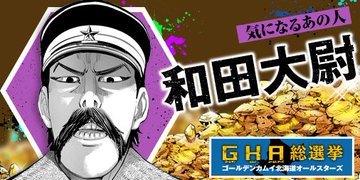
Wada (和田) - Rank: ‘Taii’ (大尉 “Captain”).
Wada: He uses ‘Watashi’ (私”I”) to talk about himself (Chap 13).
Tsurumi Tokushirō: He calls him ‘Tsurumi’ and also ‘Kisama’ (貴様 “You”) (Chap 13).

Wilk (ウイルク/Вилк) - Nicknamed ‘Nopperabō’ (のっぺら坊 “Faceless male”).
Asirpa: He calls her ‘Asirpa’ (アシㇼパ) (Chap 21). Talking about her with the convicts he calls her ‘Kochōbe Asuko’ (Chap 48).

Yamamoto (山本).
Chiyoko: Talking about her with Hijikata and Nagakura he calls her ‘Hidoro no Mekake’ (日泥の妾 “Hidoro’s Mistress”) (Chap 56).
Ejiri Matasuke: He says he is ‘Keisatsu Shochō’ (警察署長 “Police chief”) (Chap 55) and calls him just ‘ Shochō’ (署長 “Chief”) (Chap 55).
Hidoro Tamotsu: He say he is ‘Chīsana nishin-ba no Hidoro’ (小さなニシン場の日泥 “Hidoro from the small herring fishery”) and defines him as the ‘Oyakata’ (親方 “Boss”) of the ‘Toba’ (賭場 “Gambling place”) (Chap 55)
Hijikata Toshizō: He asks him if he’s a ‘Yōjinbō’ (用心棒 “Bodyguard”) (Chap 55)
Kusuda Umakichi: He calls him ‘Kusuda Umakichi’ (Chap 55) and says he was Hidoro’s ‘Ichiban no kobun’ (一番の子分 “Right hand man”) (Chap 55). Later he calls him just ‘Umakichi’ (Chap 55).
Nagakura Shinpachi: He asks him if he’s a ‘Yōjinbō’ (用心棒 “Bodyguard”) (Chap 55)
Ogata Hyakunosuke: He calls him ‘Anta’ (あんた “You”) (Chap 55).
Others: He calls Hijikata and Nagakura ‘Anta-ra’ (あんたら “You” (Plural)) (Chap 55).
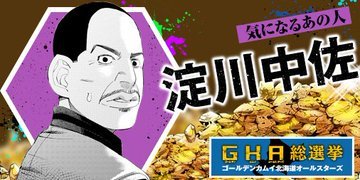
Yodogawa Terunaka (淀川 輝前) – Rank: ‘Chūsa’ (中佐 “Lieutenant Colonel”).
Nuances in the words used to say ‘I’
.
Atashi (あたし or アタシ): The “I” which is an informal effeminate form of watashi. It has a kind of “cute” nuance to it. Because kanji are generally seen as masculine, this word has no kanji form. It is written in either hiragana or katakana.
Boku (僕): The “I” which gives a masculine impression. Perceived as humble, but can also carry an undertone of “feeling young” when used by males of older age. Also used when casually giving deference; “servant” uses the same kanji (僕 shimobe). Can also be used as a second-person pronoun toward male children (English equivalent - “kid” or “squirt”); it is typically used by males, especially those in their youth.
Ore (俺 orおれ): The masculine way to say “I”. This is the word tough guys use, and as such it’s almost never used with a polite verb form. It’s worth to note though that it was also the way soldiers would say “I”, though since Sugimoto and Toraji used it prior to join the army I guess it doesn’t matter.
Watashi (私 or わたし): The standard, gender-free way to say “I”.
Nuances in the words used to say ‘you’
.
Anata (貴方 or あなた): The most common, average, regular-looking, no-nuance second person pronoun of the language. Basically you’d use anata is when you don’t know someone’s name.
Anta (あんた or アンタ): The “you” which is a shortened version of anata, highly informal and generally rude or admonishing in nature.
Kisama (貴様 or きさま): The “you” who’s currently rude, usually used between enemies and by Japanese males when angry. In old Japan it was actually a term of respect though and, later, it was commonly used among soldiers to talk to each other.
Omae (お前 or おまえ): The “you” used in very informal situations or toward people of lower status. This word feels very “blunt” and can easily come off as rude.
Temē (手前 or テメー or てめえ): The “you” rude and confrontational. Literal meaning “the one in front of my hand”. It’s a reduction of temae and it’s ruder. Used when the speaker is very angry. Originally used for a humble first person. The Kanji are seldom used with this meaning, as unrelated to its use as a pronoun, 手前 can also mean “before”, “this side”, “one’s standpoint” or “one’s appearance”.
Plural suffixes
.
-domo (ども): It used as a first-person plural it’s humble (Examples: watashi-domo) while if uses as second or third person plural implies the speaker is of higher status than those referred to and can sound derogatory. Basically it can make people’s position low, and can even be used to insult people. Usually written using kana alone. (Examples: Omae-domo, Shinsengu no oibore-domo).
-gata (方 or がた): Roughly it means “Et alia”. It’s used to turn a word into a plural but it’s also more honorific and respectful than -tachi. Basically it can make people’s position high, so it will sound weird if you use it instead than ‘-tachi’ with those who belong to your community. (Examples: Osamurai-san-gata, Danna-gata).
-ra (等 or ら): Roughly it means “Et cetera”. It’s used to turn a word into a plural but it’s rather casual and therefore slightly more rude than -tachi so it should usually only be used with family or the first person unless you have a specific reason for it or you might sound deprecating. (Examples: Anta-ra, Omae-ra).
-tachi (達 or たち): Roughly it means “And the others”. It’s used to turn a word into a plural (Examples: Anta-tachi, Omae-tachi, Henshi-tachi).
Honorific suffixes
.
-Chan (ちゃん): A diminutive suffix; it expresses that the speaker finds a person endearing. Also used to speak about children or among childhood friends.
-Dono (どの or 殿): Roughly means “lord” or “master”. It does not equate noble status; rather it is a term akin to “milord”, and lies below -sama in level of respect. It was also used in place of “sir” in the army.
-Kun (くん or 君): Generally used by people of senior status addressing or referring to those of junior status.
-San (さん): The most commonplace honorific and is a title of respect typically used between equals of any age. Although the closest translations would be “Mr.”, “Miss”, “Ms.”, or “Mrs.”, -san is almost universally added to a person’s name and can be used in formal and informal contexts for both genders.
15 notes
·
View notes